03/2024
Stephen Smith and the Unopened Testimony
Page 14
Love Steps
Page 16
“Of All People, Most Blessed”
Page 22

Redemptive Discipline
10 Redemptive Perspective




22 Faith in Action
“Of All People, Most Blessed”
Beth Thomas with Arthur Weaver
24 Discovering the Spirit of Prophecy
“That They All May Be One”
Tim Poirier
26 Bible Questions Answered
God’s Sovereignty in a Fragmented World
27 Health & Wellness
Let Food Be Thy Medicine
28 May I Tell You a Story?
“Please, God . . .”
30 Growing Faith
The Legend
The Great Balance Between the Hard and the Soft
By Justin Kim
Whether in administration, governance, civic society, or even parenting, good results occur when there is a balance of the hard and soft. The hard includes rules, law, justice, order, adherence, stability, precedence, and discipline; the soft, compassion, forgiveness, understanding, sympathy, nuance, conditions, and mercy. The right balance can prevent extremes: too hard causes things to break, while too soft results in no lessons, change, or progress. How, then, can this balance be achieved?
For example, perhaps you have been pulled over by the police for a minor traffic offense. The hard is presented before you: the law. The balance here would be to pay a penalty commensurate with the misdemeanor. But if you were speeding because you were rushing a pregnant woman to the hospital, the soft would be presented to offset the hard, resulting in balance. If the law required you to lose your fingers over a broken taillight, this would be an imbalance. If the law required a mere apology after you caused a 14-car highway smashup, this also would be an imbalance.
Finding this right balance has been the great goal of legal history. The balance has been sought by the pagan religions, the modern social sciences, and the philosophers of every age. Postmodernists have argued away the annoying question. Popular culture entertains us by presenting the extremes. But Christianity contains the clearest manifestation of the hard and the soft balance. In its understanding of the great controversy metanarrative, Adventism (arguably) presents this great balance in its broadest light, from the perspective of the universe.

The cross of Christ is where the tension finds its climax. It is the perfect revelation of good and evil. It is where peace and pain coexist. It is salvation and condemnation. It is beauty and horror; splendor and scandal; majesty and misery. The death of Jesus shows the hard in the upholding of God’s justice, but also the soft that displays God’s love for humanity. “Mercy and truth have met together; righteousness and peace have kissed” (Ps. 85:10).
Through meditating upon the cross, parents can receive the insight and patience to chide lovingly with balance. Churches can receive forbearance and Christ’s heart to discipline its membership with redemption. Conferences can manifest fairness, yet compassion, in dealing with pastors and churches. Unions can live out Christ’s commandments and character in administering institutions. The world church and its divisions can have the highest integrity with the broadest of compassion in leading out Christ’s mission to the ends of the earth. This balance is not found within. It is not embedded in knowledge, culture, or experience. Its source is found in the great foundation without: the hard and soft cross of Jesus.
We believe in the power of prayer, and we welcome prayer requests that can be shared at our weekly staff worship every Wednesday morning. Send your requests to prayer@adventistworld.org, and pray for us as we work together to advance God’s kingdom.
16 Love Steps
Ramon J. Canals
14 Stephen Smith and the Unopened Testimony
Arthur L. White
Daniel Gambo Dauda
18 Justice. Mercy. Humility.
Paul H. Douglas and Ted N. C. Wilson
Cover Photo: sezer66 / iStock / Getty Images Plus / Getty Images
Correction
In the January 2024 issue, the founders of Canvasback Missions, Inc., were incorrectly cited. Jamie and Jacque Spence started the ministry in the early 1980s.
2 March 2024 AdventistWorld.org

In Zambia, Maranatha Volunteers
International crews visit multiple well sites a day, preemptively evaluating existing wells the ministry helped to drill and replacing parts as needed. Free access to water is multiplying opportunities for community development and mission across the country.
News Moment
3 AdventistWorld.org March 2024
Photo: Maranatha Volunteers International
More Than 1,600
The number of people that were drawn to a Christmas-themed musical concert that was organized by the Quisqueya Central Seventh-day Adventist Church in Santo Domingo, Dominican Republic, at Sambil Event Hall on December 21. The free two-and-a-half-hour event, themed “The Star of Hope,” was the largest community-impact event held by the church in 2023 and is the first time in 15 years that the church has held an evangelistic event outside its sanctuary to accommodate more people in the community.
120 Years
The length of time Adventist mission that has been in focus in South Korea. The Korean Union Conference aims to harness the anniversary as a catalyst for rejuvenating missionary efforts. A diverse range of activities commemorating 120 years of missions in the country is scheduled for 2024. Within the commemorative event and its initiatives, the core focus revolves around gratitude, honor, reigniting missions, and preparing for the future.
Adventist Review Newsletter
Would you like to keep up with what’s happening in our church?
Sign up today to receive our weekly newsletter that features news stories, inspirational stories, videos, and more.
www.adventistreview.org/ newsletter-signup
Social Media
Seventh-day Adventist Church members were recently asked if they found it hard to stop using social media when needing to do so.
Source 2022-23 Global Church Member Survey
More Than 250
The distance in kilometers that Henry Smith, a member of Adventist Youth Ministries, along with Pathfinders Millicent Anna Stella Asane and Lawrence Manful walked to be able to attend the fourth West-Central Africa Division Pathfinder Camporee, held December 24-30. Setting out on December 21, the trio covered more than 250 kilometers (about 155 miles), arriving at the camporee’s opening ceremony on December 25. This pilgrimage, led by Smith, has been a tradition since 1996, and its purpose is to raise funds for orphans.
“We were inspired, enriched, and empowered. The tour stop served as a catalyst for furthering the conversations about young adult ministry in our union . . . to get the word out about these incredible emerging adults who have a passion and excitement about their faith.”
—Gregory Taylor, youth and young adult ministries director for the Southern Union Conference, about the third stop of the North American Division (NAD) Young Adult LIFE Tour. The event took place at the Spring Meadows church in central Florida, United States, and is NAD’s young adult discipleship framework, giving focus to: Leadership Impact, Intergenerational Relationships, Faith Development, and Everyday Compassion.
News in Brief
15%
28% Disagree
22% Agree 8% Strongly agree
14% I do not use social media
Strongly Disagree
13% I am not sure
N
4 March 2024 AdventistWorld.org
= 141,418
“I am honored to have participated in the
100th anniversary event of Pakistan Adventist Seminary and College.
Through
the Golden Bell Quiz competition on
the book The Great Controversy, I could feel the passion of the Pakistani young people who love the Word of God. And the joint baptism ceremony on Sabbath afternoon was an unforgettable experience.”
—Ho Young Choi, youth director of the Northern Asia-Pacific Division, about the revival event held in late November at the Pakistan Adventist Seminary and College in the Sheikhupura district, Punjab. More than 700 individuals assembled at the university church each evening. At the conclusion of the event, 148 individuals were baptized. This achievement is anticipated to contribute to more than 2,000 baptisms in Pakistan within a single year, which would be a first in the country’s history.
“Her passion and commitment were evident, and her love and zeal drove her to fight for [women’s] well-being. She fought to empower women around the world to become spiritually, mentally, and physically strong to bring forth an even better generation of women for the glory of God.”
—Dinorah Rivera, former Inter-American Division women’s ministries director, about the work of Heather-Dawn Small. Small, a longtime Adventist women’s leader and advocate, died on January 2 from cancer. During several decades Small served the Adventist Church in varying capacities. She served in Trinidad and Tobago as assistant to the president of the University of the Southern Caribbean and children’s ministries and later women’s ministries director of the Caribbean Union Conference. Small became General Conference associate director of women’s ministries in 2001 and was elected director in 2005, a position that she held until she passed away.
The number of years since the founding of Washington Adventist University (WAU). The school was founded in 1904 in Takoma Park, Maryland, United States. Through the years the school has been dedicated to education, faith, and the community. To mark this momentous occasion, the school has planned various events and activities throughout the year, which will allow the WAU community to come together and celebrate the university’s legacy of service, leadership, and faith.
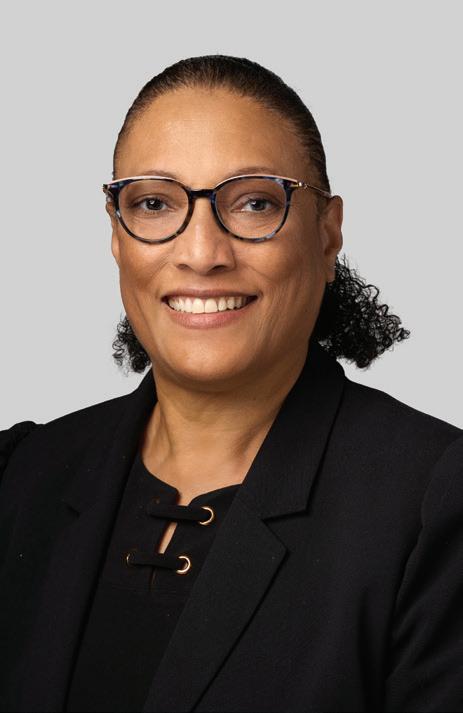
News in Brief
(->)
Photo: David B. Sherwin/Adventist Review
120
5 AdventistWorld.org March 2024
Korean Publishing House Publishes Resources in Urdu
Several recent projects of the Korean Publishing House (KPH), located in South Korea, highlight its support of Adventist mission endeavors, leaders from the Northern Asia-Pacific Division (NSD) of the Seventh-day Adventist Church recently said.
On December 2, 2023, during the Sabbath worship service of the Pakistan Adventist Seminary and College’s centennial celebration, leaders held a dedication of an Urdu prophetic and Bible study series. With the support of KPH, these and other initiatives are helping to bring the gospel to Urdu-speaking people in South Asia and particularly in Pakistan, where Urdu is the national language, spoken by more than 200 million people.
KPH also supported the distribution of 10,000 copies of Steps to Christ and 3,000 copies of The Desire of Ages, both written by Adventist Church cofounder Ellen G. White. The former project was sponsored as part of the publishing house’s independent publishing mission, while the latter was a collaborative
effort with ministry partners involving translation and production expenses, including printing and transportation, leaders reported.
KPH’s involvement in Pakistan isn’t new, as the publishing house had on previous occasions sent Adventist literature to Pakistan, a country where most people belong to the Muslim faith.
Pakistan Adventist Seminary and College president Gee Sungbae said the response has been overwhelmingly positive. He highlighted the significance of Steps to Christ, describing it as “an essential text that introduces the core of Christianity to Muslims displaying interest.” The book’s goal is to guide Christians, both established Adventists and recent converts, away from syncretic beliefs and toward a genuine understanding of Christianity’s essence, Sungbae said.
“The Desire of Ages will be distributed among local Adventist and Protestant leaders and used as a Bible study guide at the seminary,” he added.
KPH president Nam Soo-Myung also emphasized the missionary
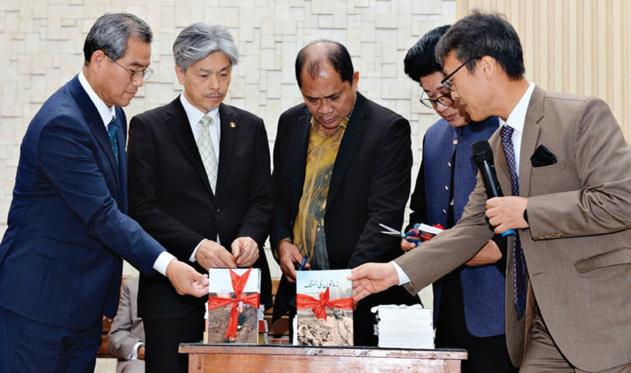
Adventist literature is now being distributed in Pakistan and other countries.
potential of the donated resources. “I hope these books will serve as a potent tool for spreading the gospel in countries like Pakistan,” Nam said. “Going forward, KPH is planning to actively support evangelism. I urge all churches and believers to take a keen interest and commit to this initiative.”
Alongside KPH, individual donors generously provided 1,000 copies of the It Is Written Bible study series. “These resources are designed as study guides for missionaries, pastors, and trained church members,” Sungbae said. “I hope these materials prove to be invaluable for outreach initiatives, as many Pakistanis are eager to explore the Bible.”
The NSD has embraced Pakistan only recently as part of its territory, after a voted request from the region to the General Conference (GC) in 2022. On October 8, 2023, at the Adventist Church’s Annual Council in Silver Spring, Maryland, members of the GC Executive Committee voted to support the change.
Pakistan, a predominantly Muslim nation in the northwest of the Indian subcontinent, gained independence from British rule in 1947. The region was initially divided into East Pakistan and West Pakistan. In 1971 East Pakistan became independent as Bangladesh, while West Pakistan became what is now known as Pakistan. With a population of 240 million, it stands as the world’s fifth most populous country. According to statistics, almost 97 percent of its population is Muslim, leaving Christians as a small minority, including less than 20,000 baptized Adventist members.
News in Depth
Northern Asia-Pacific Division and Adventist World
Leaders from the Northern Asia-Pacific Division and Pakistan dedicate resources in the Urdu language at Pakistan Adventist Seminary and College, December 2.
6 March 2024 AdventistWorld.org
Photo: Northern Asia-Pacific Division
“Better, Not Bitter” Event Draws More Than 2,000 Women to Zambia
Maggie

than 2,000
The first week of September 2023 was not just an ordinary week for many Adventist women in the Southern Africa-Indian Ocean Division (SID). More than 2,000 women from six union territories of the Seventh-day Adventist Church in Malawi, Zambia, and Zimbabwe attended a regional congress at Rusangu University near Monze, Zambia. Two hundred ninety were from the Malawi Union Conference. The theme for the regional congress was “Better, Not Bitter.”
Margery Herinirina, SID women’s ministry director, was the keynote speaker for the devotional moments. She shared with the delegates the word of God from Ruth 1:20 and 2:11. “It is good for women to be better, not bitter, as bitterness is like poison in someone’s heart that consumes good thoughts,” she said. She further encouraged the women to have hope whenever they face challenges.
“You should have trust in God and you will be transformed,” Herinirina said. She continued by encouraging women to be kind to each other so that some people can be transformed and start trusting in God through their kindness.
SID president Harrington Simui Akombwa attended. Akombwa said it
was high time for women to arise and shine in the name of the Lord. “We are in a world full of challenges, but let us rise, shine, and pray,” he said. “And the challenges will disappear.”
Other leaders presented on various topics. Zimbabwe East Union Conference stewardship director Trymore Mutimwii spoke on women and evangelism. Gift Mweemba, a retired minister and leader in the Southern Africa Union Conference, also encouraged participants to be better, not bitter. “Women should have high self-esteem because they are individuals on their own,” Mweemba told attendees. “You should trust in yourself that you can do better. . . . Be proud of yourself, as Jesus Himself trusted in His mother while He was on earth.”
Precious Milingo, a member of Olive Seventh-day Adventist Church in Kampala, Uganda, and a founder of Utano Health Solutions, took the guests through issues related to women’s health. An executive director in the Reserve Bank of Malawi, Mercy Kumbatira, presented on the topic of women and finances. On women and violence, Maimba Ziela, a managing partner at Lusitu Chamber and a personal ministry director in Northern Zam-
bia Union Conference, advised, “Do not hide or be silent when abused. Please seek help.” And on busy women and work balance, Linda Sibanda, Northern Zambia Union Conference women’s ministry director, advised women to develop time-management skills. “Learn to value those around you and work with them as a team to avoid burnout,” she advised. “And learn to say no.”
Nokanyo Lulu Ndlovu, from South Africa, was the main speaker during the daily power hour and evening service. “Let us choose hope and gratitude over bitterness whenever we have challenges,” Ndlovu said. “Let’s thank God in everything and write down good things the Lord has done to us. When we live in prayer, we will have gratitude, and our children will imitate it.”
During the event women went out for outreach activities. They visited Monze Mission Hospital, Monze Prison, and the Choongo School for children with disabilities. Women distributed assorted items, such as slippers, soap, books, and cash.
The congress lasted four days and was closed by union parades with cultural presentations.
News in Depth
Photo: Southern Africa-Indian Ocean Division
Congress speakers emphasize essential role of Adventist women for the church.
Chikhambi, for Southern Africa-Indian Ocean Division, and Adventist World
More
Seventh-day Adventist women in southern Africa enjoyed worshipping and learning together in Monze, Zambia.
7 AdventistWorld.org March 2024
Adventist Youth in Canada Serve Needs of Indigenous People
The Adventist Development and Relief Agency (ADRA) in Canada provides emergency management and development around the world. In many ways the agency is a reflection and extension of the worldwide Seventh-day Adventist Church. It’s not only the ADRA offices in more than 100 countries that make ADRA’s work a success; it’s also the broader church community that creates and drives vision for what serving our communities can look like.
The youth and young adults of the Seventh-day Adventist Church in Canada had cast a vision for what it would mean to make a difference right at home. Their vision: to work for the betterment of people’s lives in ways that were responsive to their actual needs. From this vision sprang up a goal: to do something to help indigenous people in a tangible, practical, and nonmanipulative way that fosters true connection and friendship.
During 2023 four groups of young Adventist volunteers traveled to various indigenous commu-
nities in northern Ontario. ADRA’s own longstanding relationship with the partner organization on the ground, the Independent First Nations Alliance (IFNA), allowed these Adventist groups to partner with indigenous peoples to do meaningful and practical work on fire prevention and fire safety. This is a topic close to the heart of many Canadians, especially after a year of unexpectedly large wildfires.
Alongside ADRA Canada’s former national programs manager, Daniel Saugh, and the agency’s digital fundraising and social media strategist, Randy Sidaoui—both of whom accompanied the group in Whitesand—the teams of Adventist young adults served the needs and projects that mattered on these reserves.
“Our primary goal was to stand in solidarity with the indigenous communities, working on vital fire prevention, protection, and recovery assistance,” Sidaoui said. “It was also an opportunity to learn from indigenous peoples about their valuable and storied land-preservation techniques. Our
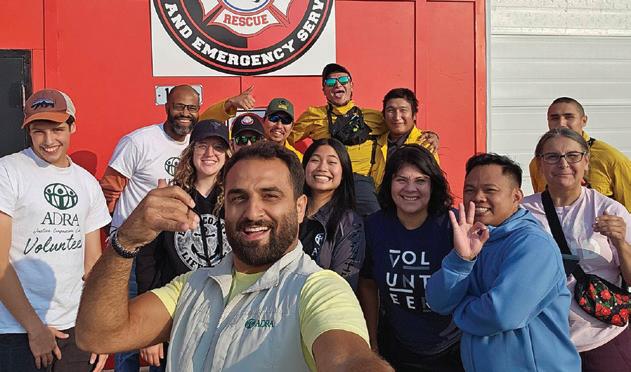
ADRA’s partnership helped bring about a fire safety project.
enthusiastic team helped to install fire alarms in houses that didn’t have any and cleared dry brush and other debris from a fire guard.”
The teams also checked previously installed fire alarms to ensure they were all still working, and did various tasks as needed to support the local workers: cleaning the trucks and fire hall; numbering and updating information on houses in the area to enhance the efficiency of disaster response; and providing meals to the workers as a gesture of friendship.
Before working alongside people from these nations, team members received sensitization training. Organizers encouraged them to take the Four Seasons of Reconciliation training program that was created by First Nations University and made available through the Canadian Adventist Church’s indigenous ministries office. These training resources ensured that interactions between Canadian volunteers and indigenous people were as respectful and amicable as possible.
“It was an incredible journey where we met amazing and welcoming people,” Sidaoui added. “So many of the young people we met care so deeply for their community and work so hard to protect the people around them.”
For Sidaoui, “it was a real blessing and a mind-opening experience to be among indigenous people for a week, sharing meals with them and participating in one of their traditional ceremonies. The best parts of this experience were the warm welcome we received in the community and the chance to forge what we hope may become new lifelong friendships,” he said.
News in Depth
ADRA Canada and Adventist World
ADRA Canada helped Adventist young people spend time with and learn from indigenous peoples in northern Ontario.
8 March 2024 AdventistWorld.org
Photo: ADRA Canada
Mission Focus

How a Trip to the Holy Land Became a Source of Inspiration
A young couple’s visit is now a TV series on Hope Channel Inter-America.
A young Seventh-day Adventist couple from Mexico found an appealing way of following in Jesus’ footsteps: by sharing their dream trip to the Holy Land through what has become a television series on Hope Channel Inter-America.
When César Martínez, 30, and Gaby Chagolla, 26, got married in 2019, they had one dream: to make the most of a honeymoon by traveling to the Holy Land in Israel. When they found out they didn’t have enough funds at that time, they settled into their jobs and building their savings. The couple moved out of Tuxtla Gutiérrez, Chiapas, and started new jobs. One night in 2021, as they studied the book of John with friends, César and Gaby felt inspired once more about visiting Jerusalem and its surrounding places. They felt it was an attainable dream, and they decided to put it in God’s hands.
“We knew that we didn’t want to have a spiritual experience just for ourselves, but to share it with others,” César said. They devised a plan. They would do the trip and post about it in Gaby’s YouTube channel, Séptima Estación (Station 7). On that channel she usually shares Bible verses, spiritual lessons, and positive messages to her more than 30,000 followers. “We wanted to make sure the content could get to many people,” Gaby said.
César agreed. “As we kept praying for our dream, our lifestyle changed,” he said. “We began to save money, think differently about our spending, trusting God.”
After a year of saving every bit they could, they purchased their tickets. With the tickets secured, they began to do more research for their journey and come up with content to share. Pase de Abordar (Boarding Pass) was the name they came up with for their adventure in Jerusalem.
As they began to think of reaching people online, they thought, Why not reach a larger audience? “We mentioned it to Hope Channel Inter-America leaders; they liked the idea, and another dream was born—to produce a television series,” Gaby said.
In November 2022 they traveled to Jerusalem and recorded six episodes while visiting Galilee, Bethle-
hem, the Garden of Gethsemane, and other prominent places in the Bible.
“As we traveled, we shared with our social media audience every step of our journey, and the response from so many people really touched us,” Gaby said.
Their travel experience included many outstanding moments. “There’s nothing more beautiful than to see the places where Jesus went and experience that confirmation of the historical evidence mentioned in the Bible,” César said.
For Gaby, welcoming the seventh-day Sabbath in front of the Wailing Wall in Jerusalem’s Old City and visiting the closest Seventh-day Adventist church was unforgettable. “We took part in a beautiful spiritual feast with praises on the Sabbath,” Gaby said.
The response to Pase de Abordar has been a true blessing, Gaby said. “People have thanked us, have shared that they have watched every episode with their coworkers, friends, and families.”
Pase de Abordar is the first series that is a more practical, social, youth-oriented series on Hope Channel Inter-America, Abel Márquez, executive director of Hope Channel Inter-America, said. “We learn from their experience, because it is a couple eager to share the message of love and hope found in Jesus.”
Photo: Leslie Torres/HCIA
Social media influencers César and Gaby Martínez’s dream of visiting the Holy Land resulted in a TV series on Hope Channel Inter-America.
Libna Stevens, Inter-American Division, and Adventist World
9 AdventistWorld.org March 2024

Redemptive Perspective
Church discipline in Matthew 18
BY DANIEL GAMBO DAUDA
Focus 10 March 2024 AdventistWorld.org

The elements of the process suggest how valuable humanity and human relationships are to God.
The Bible offers guidelines for how we should relate to each other at any given level. Restoring sinners, no matter how large the offense, to a saving relationship with Christ is something that the church must do.1 This fact is reflected in the various aspects of Christ’s teaching, as His life and teachings were centered on salvation. For instance, when He was asked why He was associating with those who were considered dishonest in transactions (tax collectors) and the outcasts (sinners) in society, He unequivocally responded by highlighting the purpose of His mission—namely, to rescue sinners (Luke 5:31, 32). This, therefore, defines the purpose of the existence of the church: providing an enabling environment for the renewal or enhancement of a relationship with Christ through the community.
Matthew 18 shares some steps designed to lead to a meaningful effort in redeeming the fallen. The elements of the process suggest how valuable humanity and human relationships are to God. In light of this, eagerness to satisfy the requirements of church procedures and rules relating to discipline should not eclipse the focus of the community of believers to its redemptive purpose of existence.
BIBLICAL PRECEDENCE
Frank Armstrong / iStock / Getty Images Plus / Getty Images
Examples of discipline, whether directly imposed by God or by a group of individuals under God’s orders, abound in the Bible. The sins of the sons of Aaron, Nadab, and Abihu incurred the instant wrath of God (Lev. 10). Jeroboam the son of Nebat was struck down for his rebellion (2 Chron. 13). The sins of Jezebel (2 Kings 9) attracted the displeasure of God. Other instances include Uzzah’s disobedience (2 Sam. 6), the express command by God to put to death the false prophets (Deut. 13), Sabbath desecration (Neh. 13:15-22); adultery, and bestiality that attracted punishment by death (Lev. 20). Samson was punished for the sin of lasciviousness (Judges 16) and David was chastised by God (2 Sam. 12:9, 10).
New Testament Jews practiced discipline as evidenced by the fear of the parents of the blind man in John 9 who feared that they could be put out of the synagogue by the Jewish leaders (verse 22). The deaths of Ananias and his wife, Sapphira, which occurred as a result of willful disobedience to the laid-down principles of giving (Acts 5), also suggest church discipline. Another example from the book of Acts is the summoning of Stephen before the Jewish council, which consequently led to his murder (Acts 6; 7). Paul’s epistles also give some insights into church discipline. Probably the most applicable among them is 1 Corinthians 5:1-12, in which Paul rebuked the church for its tolerance of a member who was engaged in a sexual relationship with his stepmother. Paul clearly instructed that such a person should be removed from among them. Speaking about those who stir controversy in the church, the apostle Paul recommends disciplinary measures (Titus 3:10, 11; other related passages include 1 Tim. 1:19; 5:19-21; 2 Thess. 3:14, 15; Gal. 6:1; 2 Cor. 2:6-8).
11 AdventistWorld.org March 2024
LOVE AS THE FOUNDATION
According to Matthew, there are three steps to exhaust in redeeming the erring. First, let the offender know that they have done wrong (Matt. 18:15). If this effort fails to yield the desired result, then bringing one or two witnesses becomes necessary (verse 16). Should this effort at reconciliation fail again, then the church has to be apprised of the situation (verse 17). At this point the offender risks their status in the community, as they assume the position of a “tax collector” or “publican” if they fail to listen to advice.2 Some may think this third step leads to excommunication, abandonment, or some other form of social relegation. This, however, does not seem to be the case, as the sinner should not be despised or neglected regardless of the enormity of the offense.3 Instead, a new phase of nurture, care, and pruning on the part of the church has offered itself.
We see a similar idea in Hebrews 12:4-13, where corrective measures form a confluence between discipline and love. Love as the foundation when administering discipline is essential in fulfilling its ideal goal. Further accentuating the basis of discipline, Paul aptly stresses that those who are not disciplined are not fittingly grafted into the family of God, for the demonstration of God’s love for His children is reflected also in the chastening they experience from Him (verse 8). It is, however, worthy of note that it is not God’s desire to subject His children to a perpetual state of alienation from the full fellowship of the church, but rather to spur them to experience a healthier spiritual condition.
The idea of establishing a matter before more than one witness (Matt. 18:16) echoes Deuteronomy 19:15: “One witness is not enough to convict anyone accused of any
crime or offense they may have committed. A matter must be established by the testimonies of two or three witnesses” (NIV). The testimonies of the witnesses will either set the accused free (loosed) or make them imprisoned (bound). In the Greek text Matthew 18:18 translates to “shall have been bound” and “shall have been loosed” and conveys the idea of having any earthly decision being determined or guided by the decision above.4 By implication, the ratification of the church’s decision in heaven is dependent on its adherence to the laid-down principles in the Bible— love, compassion, and care—in the cause of treating the erring.
POSTDISCIPLINARY CARE
“Again I say to you, that if two of you agree on earth about anything that they may ask, it shall be done for them by My Father who is in heaven” (verse 19, NASB) 5 “For where two or three have gathered together in My name, I am there in their midst” (verse 20, NASB). The contextual meaning of this statement may not be far from the two witnesses mentioned in the preceding verses (15, 16). Thus, the gathering of the two is to resolve a matter of dispute; hence, reconciliation is greatly anticipated. The Jewish judicial system requires the two witnesses to be the first to execute the judgment of the court (Deut. 17:7) and or offer a “prayer of execration given at a Jewish excommunication; or they could represent prayers for the repentance and consequent forgiveness of the excommunicated person.”6
By turning down the counsel of the church the erring one has separated themselves from the constituted body of believers and relegated their status to the level of “a heathen and a tax collector” (Matt. 18:17). This does not imply that
the erring one should be neglected, since the heathen and tax collectors were not exempted from the plan of salvation, as demonstrated by Jesus when confronted while eating and associating with sinners and tax collectors (Mark 2:13-17). The inclusive nature of the work of salvation necessitates putting every machinery in place to ensure an in-reach effort toward reclaiming the erring one, just as it could be done to a heathen or tax collectors who are in dire need of a Savior. Believers should be careful not to give the erring one reason to feel as though they were treated unfairly. Likewise, members need to exercise caution so as not to share in the sin by either participating in or condoning the evil through any form of false sympathy afterward.
CONTEMPORARY CHURCH DISCIPLINE AND MATTHEW 18:15-20
The Scriptures have clearly outlined the steps to be taken in the process of administering discipline. The most important principle for the application of Matthew 18:1520 in the contemporary church as it relates to the matters of disciplinary measures is that discipline is for the purpose of redeeming a straying believer. It is not merely about satisfying the requirements of church policy as outlined in the Church Manual, which may indicate an action is necessary. Glenn Waddell asserts that “every step of Matthew 18:15-17 . . . must be taken with the purpose of and heart inclined toward promoting repentance, reconciliation and restoration to the covenant community.”7 The position assumed by the unrepentant “heathen” or “tax collectors” places the church in a higher state of responsibility in ensuring the salvation of the strayed member just as they could to a heathen for
12 March 2024 AdventistWorld.org
whose purpose the church exists. Speaking in this direction, Wyman L. Richardson postulates that “it was, after all, to Gentiles and tax collectors, to unworthy people, that the hope of the gospel was offered in Christ. So we are now to treat our fallen brother as a missionary would treat one who has not heard the gospel. We are to explain the gospel to them, reintroduce them to what it means to be a Christian, and plead with them for their return.”8
BENEFITS OF CHURCH DISCIPLINE
There are benefits of disciplinary actions when done under the auspices of the Holy Spirit. In some cases the corrected erring members come to appreciate the intervention when they understand that it was to help them spiritually. The discipline provides the erring with an opportunity to become more deeply rooted in the faith as they take the religious teachings and instructions more seriously. Further, disciplinary measures help to deter others from following the example of bad behavior. This helps to protect the community of believers. As Paul admonished Timothy: “Them that sin rebuke before all, that others also may fear” (1 Tim. 5:20, KJV).
Church discipline offers the church the opportunity to experience a better and more solid relationship with Christ and one another. “Purge out therefore the old leaven,” Paul writes, “that ye may be a new lump” (1 Cor. 5:7, KJV). When discipline is administered in love and following the guidance laid down in Scripture, it has the potential of preserving the spiritual and moral integrity of the church. Ellen White stresses that “the evil must then be made to appear as it is, and must be removed that it may not become more and more widespread.”9
Beyond that, church discipline enhances the spiritual growth of the church and its prosperity.10 The redemption of a sinner from the power of sin and its effect is the core of the plan of salvation for humanity (Col. 1:12, 13).
CONCLUSION
The church is an invaluable avenue to facilitate the salvation of people. Disciplinary actions are corrective measures that should provide a redemptive atmosphere for the erring. Simultaneously, church discipline helps to maintain a high standard of abhorrence of sin that has the tendency of bringing reproach to the cause of God and consequently dimming its appellation “Light of the World.”
Every member of the community has the noble responsibility of pursuing the course of helping the erring to retrace their steps back to a saving relationship with God as candidates of heaven. It is within the purview of the church to put in place some mechanisms to provide hope to the strayed as well as means to help them overcome their sinful tendencies.
1 Ellen G. White, Testimonies for the Church (Mountain View, Calif.: Pacific Press Pub. Assn., 1948), vol. 7, p. 260.
2 Roger E. Dickson, Dickson’s Teachers Bible: International King James Version With Commentary and Encyclopedic Study Guide (Cape Town, South Africa: Africa International Mission, 2001), p. 1109.
3 The Seventh-day Adventist Bible Commentary, ed. Francis D. Nichol (Washington, D.C.: Review and Herald Pub. Assn., 1980), vol. 5, p. 448.
4 Ibid
5 Scripture quotations marked NASB are from the New American Standard Bible, copyright © 1960, 1971, 1977, 1995, 2020 by The Lockman Foundation. All rights reserved.
6 Craig S. Keener, The IVP Bible Background Commentary: New Testament (Downers Grove, Ill.: InterVarsity Press, 1993), p. 91.
7 Glenn G. Waddell, “The Meaning of Matthew 18:17B in Its Historical and Literary Context and Its Application in the Church Today” (M.A. thesis, Reformed Theological Seminary, 2014), p.71.
8 Wyman Lewis Richardson, Walking Together: A Congregational Reflection on Biblical Church Discipline (Eugene, Oreg.: Wipe & Stock, 2007), p. 101.
9 E. G. White, p. 263.
10 Ibid.
Daniel Gambo Dauda, Ph.D., is a lecturer in the Religious Studies Department at Babcock University, Nigeria.

The ratification of the church’s decision in heaven is dependent on its adherence to the laid-down principles in the Bible—love, compassion, and care.
13 AdventistWorld.org March 2024
The following concerns Stephen Smith, who was once convicted for truth but decided to go his own way. His story reveals how the early church dealt with church discipline and how the Holy Spirit effects spiritual change.—Editors.
In 1850 Stephen Smith, of Unity, New Hampshire, was entering the field of public ministry but was swept off his feet by erroneous truth. He refused to accept the warning counsel, picked up other strange ideas, and joined the opposition. At a conference in Medford, Massachusetts, James and Ellen White were met by his work.
James wrote: “When we arrived there, disunion existed among the brethren. They had been visited by Stephen Smith and Josiah Hart, who had tried to prejudice them against us. It had had a bad effect, but we went on with the meeting.
“The burden of the meeting was pointing out the errors of S. Smith, H. W. Allen, and the importance of church action as to the course of some brethren. Ellen had a vision and saw the frown of God was on us as a people, because the accursed thing was in the camp, that is, errors among us, and that the church must act, and the only
way to do Brethren Allen and Smith good was to withdraw fellowship from them, in their present position. All acted on the light given, all received the vision, and, even to an individual, all raised the hand to withdraw fellowship from them.”
THE CONFERENCE AT WASHINGTON, NEW HAMPSHIRE
Ellen White described a meeting at Washington (1851) in detail, giving illuminating glimpses of what took place.
“At Washington the Lord took the rule of the meeting Himself. Stephen Smith and Brother [E. P.] Butler were present. There were about 75 present, all in the faith. Brother Stephen Smith was filled with the wrong spirit. J. Hart and himself had filled the minds of many of them with prejudice against us; false reports had been circulated. The band had been sinking and had lost the power of the third angel’s message. They
Stephen Smith and the Unopened Testimony
were sickly, but knew not the cause, but the reason was that there was an accursed thing in the camp and by the assistance of God we were trying to get it out of the camp.
“[On Sabbath] I was . . . taken off in vision. . . . The state of things was revealed to me in Washington, which I declared plainly to them. The vision had a powerful effect. All acknowledged their faith in the visions except Brother Butler and S. Smith. We all felt it duty to act, and by a unanimous vote of the brethren, S. Smith was disfellowshipped by the church until he should forever lay down his erroneous views.”
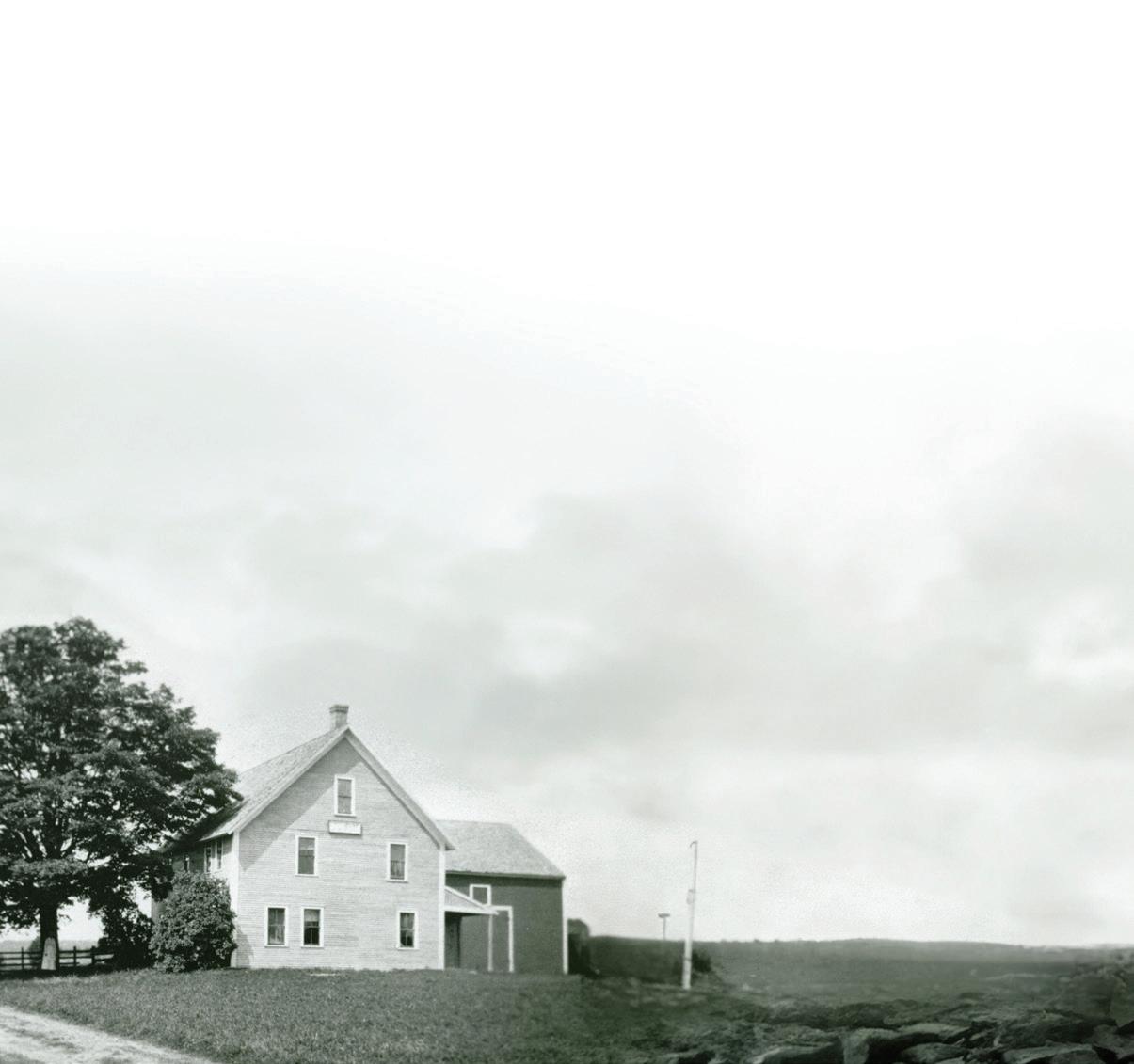
About a year after he was disfellowshipped, Stephen Smith came to see his errors, confessed, and was restored to fellowship in the church (1852). This continued for a few months, and then he again became involved in erroneous views and was disfellowshipped. In 1857 he found his way back, but only for a short time.
At some point in the 1850s, after one of his lapses, Ellen White wrote him a testimony in which she depicted what his life would be if he persisted in the course he was following. When he received the letter, he feared that it was a testimony of reproof, so he took it home from the post office and tucked it deep in a trunk, still unopened and unread.
For nearly 30 years Stephen Smith was out of the church, opposing his former brethren, mean and cutting in his criticism. His wife remained faithful, and the weekly Review came to their home. One day Stephen Smith picked it
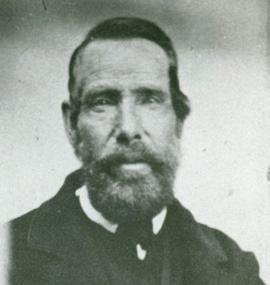
Feature
12 miles
Believed
to be Stephen Smith’s home in Unity, New Hampshire, United States, located about
walking distance from the Washington, New Hampshire church.
Stephen Smith
Ellen G. White Estate
Photo: Ellen G. White Estate
up and read an article from Ellen White. He continued to read her articles and found they spoke to his heart. He began to soften.
REVIVAL AND REFORMATION
In 1885 E. W. Farnsworth was holding revival meetings in the Washington church. Stephen Smith walked 12 miles to attend the Sabbath meeting. When the sermon was over, he rose to his feet and asked to speak. The audience expected a blast of criticism and meanness.
“I don’t want you to be afraid of me, brethren,” he said. “I have not come to criticize you. I have quit that kind of business.” Then he reviewed the past, his hatred of church organization, his joining one opposition party after another, which he had seen go down and their sympathizers come to confusion. “Facts,” said he, “are stubborn things, but the facts are that those who have opposed this work have come to naught, while those who have been in sympathy with it have prospered, have grown better, more devoted and godlike. Those who have opposed it have learned only to fight and debate. They have lost all their religion.
“No honest man can help seeing that God is with them and against us. I want to be in fellowship with this people in heart and in the church.”
Stephen Smith remembered the letter from Ellen White in his trunk. After returning home, he soon had the unopened envelope in his hands. He tore it open and read its contents.
He returned to Washington the following Sabbath, where he heard Farnsworth preach
on the Spirit of Prophecy. When the sermon was finished, he was on his feet again.
“I received a testimony myself 28 years ago. I took it home and locked it in my trunk, and never read it till last Thursday.” He said he had not believed the testimony, even though he had not read a word of it. He was afraid to read it, fearing it would make him mad. But, said he, “I was mad all the time, nearly.”
“Brethren, every word of the testimony for me is true, and I accept it. I have come to that place where I finally believe they [the testimonies] all are of God, and if I had heeded the one God sent to me as well as the rest, it would have changed the whole course of my life, and I should have been a very different man.
“Any man that is honest must say that they lead a man toward God and the Bible always. If he is honest, he will say that; if he won’t say that, he is not honest. If I had heeded them, they would have saved me a world of trouble. . . . I thought that I knew as much as an old woman’s visions, as I used to term it. May God forgive me! But to my sorrow, I found the visions were right, and
“If I had heeded the one God sent to me as well as the rest, it would have changed the whole course of my life.”
the man who thought he knew it all was all wrong. . . . The testimonies are right and I am wrong.”
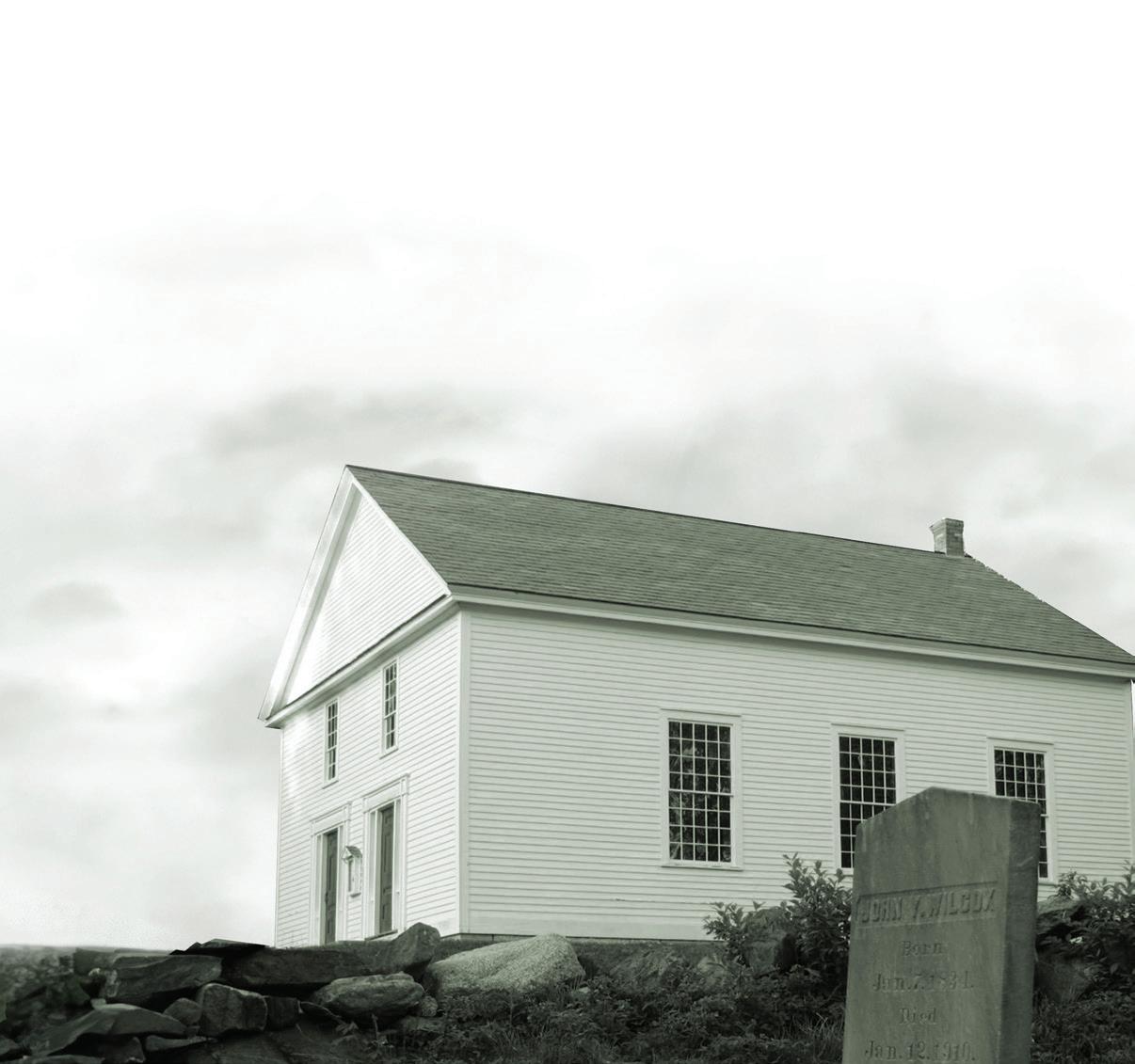
“Brethren, I am too old to undo what I have done. I am too feeble to get out to our large meetings, but I want you to tell our people everywhere that another rebel has surrendered.”
A real change took place in Stephen Smith’s life and experience, and he was remembered in his later years as a kind, sweet, wholehearted Seventh-day Adventist.
Adapted from Arthur L. White, Ellen G. White: The Early Years (18271862) (Hagerstown, Md.: Review and Herald Pub. Assn., 1985), pp. 216-218; 490-492.
The Washington, New Hampshire, church, where the first group of Adventists kept the seventh-day Sabbath
15 AdventistWorld.org March 2024
Photo: AdventistHeritage.org
Love Steps
Reflections on a disciplinary experience
BY RAMON J. CANALS

In one church I pastored early in my ministry, I encountered a well-educated, well-connected engineer from a very well-to-do family. Apparently the pastors that had preceded me had never addressed an issue concerning this individual that everybody in the church knew about. They simply hadn’t found a way to address it. The issue was about Sabbath observance—this person was working on the Sabbath. He would come to church whenever he could, but most Sabbaths he would be
working. And the church knew this. There were some in the church who said, “We need to do something about this. This person is violating the Sabbath. How can we ask people to follow the law when we allow this person to break the law, and nothing has been done for years?” Then there were those who felt less strongly about it. “He’s still young,” they reasoned. “Besides, he’s very faithful to the church in tithes and offerings,” they would add. Needless to say, it was causing some issues in the church.
TAKING STEPS
When I came in as the pastor, I heard from both sides, and I had to ask myself the question “What do I do? What is my responsibility?”
As I studied the Bible, the Spirit of Prophecy, and the Church Manual, I realized I had to do something. Not because of those who wanted me to take his name off the books or to bring him to the church for discipline, but if I were to do something, it had to be to help him. That was the approach I chose. Not to come down hard on this man, with
Focus
iStock / Getty Images Plus / Getty Images 16 March 2024 AdventistWorld.org
Photo:
PeopleImages /
threats of consequences if he did not get in line, which was what one group in the church was pushing me to do. They had pressured the previous pastors until the pastors decided not to touch the issue. That was not an option for me.
First, I began to pray for him. After some time I told him I wanted to visit him at his home. He was a little nervous, because he surmised the reason I wanted to visit. Ultimately, though, he agreed. On my first visit I didn’t even talk about the Sabbath. I just had a friendly conversation with him, prayed with him, and left. He was very pleased, because he had been bracing for a confrontation. At my next visit we chatted, I prayed with him, and again I mentioned nothing about his situation with the Sabbath. We did, however, talk about his spiritual life and the importance of growing spiritually. We also talked about the importance of God’s law. As I kept visiting, we established a visitation pattern.
Eventually, during one of our visits, I brought up the Sabbath issue. “Well, you know,” he retorted, “I’ve been doing this for years, and many pastors have come through here and they’ve never talked to me about this.” Apparently the company he worked for had refused to accommodate his request to have Sabbaths off. “They said no. They can’t give me that privilege, because if they give it to me, then they have to give it to other people.”
“Are you willing to try again?” I asked. “Let’s make this a matter of prayer,” I pleaded. “It’s not about what I want. It’s about what God wants for your life. It’s not about the church telling you what you should do. It’s about you being able to come to church on the Sabbath to worship God.”
“No,” he insisted. “I don’t really care for that. I don’t want to try again.”
At that point I let him know that I was compelled to address the matter to the church. The church would then decide what to do with his case. “You can do nothing to me!” he said defiantly. I assured him that I wanted only to help him and his family. Bringing it to be addressed by the church was the next step. After praying with him, I left.
SOMETIMES IT WORKS
The next Sabbath he was in church. Mind you, he had come to church only once a month or so before then. That Sabbath he came and asked to talk to me in private. “I want to thank you,” he began, “for helping me see what I was not seeing. For years I have been violating the law, knowing that I was doing something wrong. Although I felt guilty about it, nobody ever talked to me the way you did, so I got upset with you! But now I realize that you were only trying to help me spiritually, and I want to thank you for that.”
From that day forward he came to church enthusiastically every Sabbath. He even shared with other church members how pleased he was that we were able to talk things out and resolve the issue without escalating it to a discussion by the church.
My experience taught me that steps can be taken to help an erring brother or sister before you get to the point of church discipline. I call them love steps, where you really love the person, you pray for them, visit them, study the Bible with them, and care for them. When you do that, you may not have to go to the extreme of church disciplinary measures. Does it always work? No, it doesn’t work all the time. There may be some people who say, “No! Forget it.” But sometimes it works. And it’s the proper way of doing it, because disciplining is about
It is not about punishing people for their wrongdoings. It’s about calling them back to a right relationship with Jesus.
redeeming people. It is not about punishing people for their wrongdoings. It’s about calling them back to a right relationship with Jesus. And when they heed the call, heaven rejoices, and people are happy.
There was a time that the church disciplined people for every minor offense. Today we are more likely to let everything go. But we have to be honest with people. Avoiding the issues does not help anything. Yes, the church is a community of broken people. We all have issues; we all have our forms of dysfunction. We come together as a church to form a family in Christ, each bringing our dysfunction that needs healing. So we need leadership that knows and understands grace from personal experience to administer grace, love, and forgiveness to erring members. Is it not better to try to help someone lovingly than to let them continue down a sure path to destruction?
Ramon J. Canals is secretary of the General Conference of Seventh-day Adventists’ Ministerial Association.
17 AdventistWorld.org March 2024
Justice. Mercy. Humility.
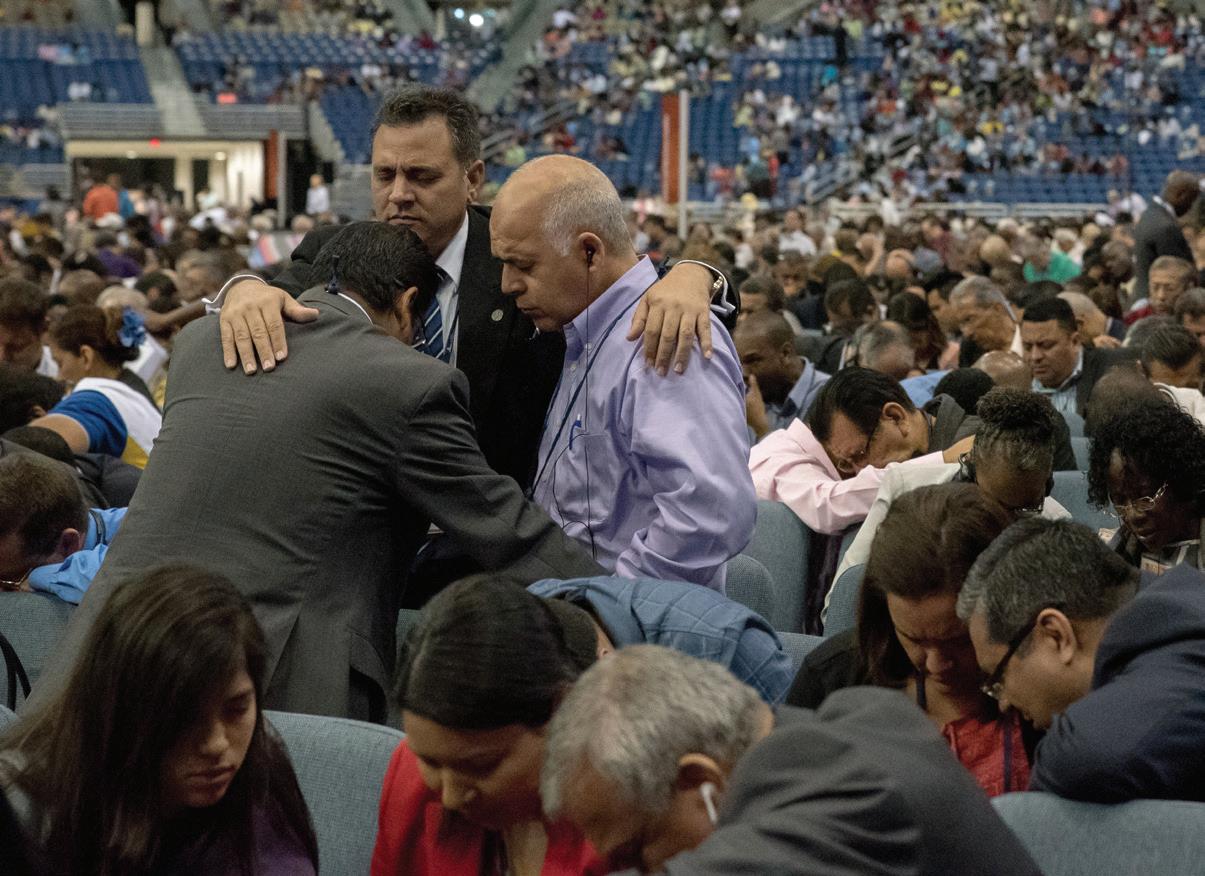
Ingredients in organizational discipline
BY PAUL H. DOUGLAS AND TED N. C. WILSON
Our mission, this grand partnership that we have with God to proclaim the three angels’ messages to the world, benefits from structure and organization. When we all consent to it, the structure of the Seventh-day Adventist Church provides a system to guide the efficient proclamation of the gospel. At times, however, organizations do not align with the terms agreed upon by a representative majority of the church. The nature of the agreement held by organizations of the Seventh-day Adventist Church and the means by which unity may be achieved are the subjects of this article.
AN IMPERATIVE
Church discipline, first of all, does not originate with the church. It originates with God. The Ten Commandments, an expression of God’s character of love, outline how we should relate to God and to others. As sinners, we have broken God’s perfect law of love, but when we accept His salvation, God justifies us without any merit on our part. Then sanctification comes in, as we are to be more and more like Him, all through His power. That process requires merciful disciplinary measures to bring us into a better relationship
with the Lord as He seeks to restore His image in us. Discipline, then, is part and parcel of the plan of salvation. It is a means to bring about a closer walk with the Lord.
Micah 6:8 provides a framework for church discipline. It tells us that God has shown us what is expected of us, and that is, first, to do that which is just or right. We need a respect and love for God’s commandments and doing things in a proper way. While we understand that we must do that which is right, we don’t always do that. So Micah’s second point is that we must love mercy.
Being merciful is another aspect of discipline that is aimed at drawing us closer to God in a loving relationship. God doesn’t simply cut us off because we don’t do that which is right. He brings in mercy for us. We are also to follow His
View
Global
18 March 2024 AdventistWorld.org
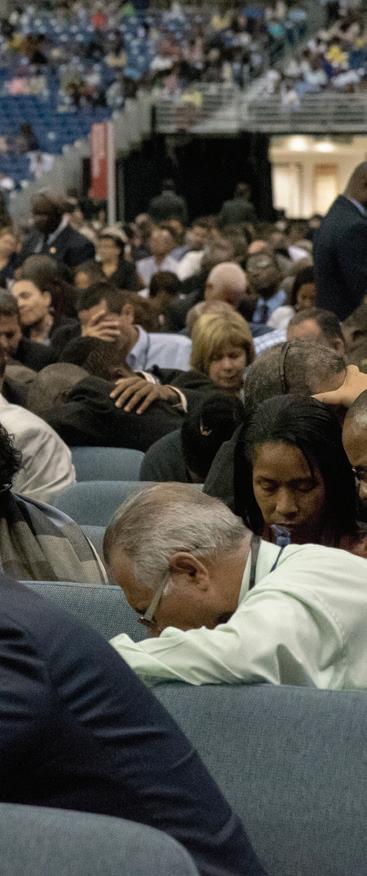
example. This doesn’t mean you excuse something that is wrong. It means we focus on reconciliation back to God and to our fellow human beings. The last part of Micah’s discipline formula tells us that we need to walk humbly with our God, submitting every disciplinary effort to His wise guidance.
The church didn’t come up with some strange disciplinary measures because it just wanted to. “The Bible and the Spirit of Prophecy set forth in clear, unmistakable language the solemn responsibility that rests upon the people of God to maintain their purity, integrity, and spiritual fervor. If members grow indifferent or drift away, the church must seek to reclaim them for the Lord.”1 The concept of church discipline has to do with the ultimate restoration of human
beings into the image of God.
In the early days of our denominational existence, before we even had an organized General Conference, people were very loath to give any kind of deference to dogma that would force people to believe in a certain way. Everything was left to the individual. They didn’t want a creed outside of the entirety of the Bible. As the church developed, however, the need for order increased, and it became clear, when the Seventh-day Adventist Church was constituted, that certain regulations and processes would allow for the smooth functioning of the church.
AN AGREEMENT
The organizational levels of the church provide guidelines, and in some cases regulations, for how we ought to act, relate with, and be part of God’s last-day remnant people. These guidelines and regulations are enshrined in church policy, which is voted at designated meetings. The Church Manual is of such importance that, while changes may be voted in as recommendations at Annual Council or Executive Committee meetings, they are then forwarded to the General Conference in session for a vote. The Church Manual deals primarily with church discipline in a local church context. One can see, however, how it relates also to the local conference, union, division of the General Conference, and the General Conference representing the world field, as every denominational employee is a local church member.
When an individual who has accepted Jesus Christ as their personal Savior becomes a member of the Seventh-day Adventist Church, they consent to the belief system of the church and vow to live accordingly. Should such a time come when they no longer believe as Adventists believe or choose not to
live as Adventists commit to, they disclaim their former commitment to being a member of the church. Membership in the Seventh-day Adventist Church is held by consent of those who are in the local church.
Likewise, organizationally the Seventh-day Adventist Church functions by mutual consent. Through this consent the working policies of the church are developed. These are commonly accepted agreements on how we’re going to carry out the mission of the church without getting in each other’s way and fighting against each other. They are not the Bible, but are based on biblical principles for how we may work harmoniously under the Holy Spirit’s guidance to fulfill His mission. Note that the ultimate purpose of the Seventh-day Adventist Church is not merely to have an organization that works nicely and tries to serve its members and help the community. That’s certainly part of it. But the main purpose of the Seventh-day Adventist Church is to proclaim the three angels’ messages of the Lord and prepare people for Jesus’ soon coming.
The authority of the policy documents developed by the church is based on our governance structure, which is “representative in form with executive responsibility and authority assigned to a variety of entities and institutions and their respective constituencies, boards, and officers through constitutions or articles of incorporation, bylaws, and operating policies and guidelines.”2 The fact that our governance is representative means the voices of the world field are represented in policy decisions. All elements of the church are involved in deciding what the policies will be and thereby consenting to abide by the policies.
Organizational entities can’t simply decide, without undermin-
Dominik Zeh / Adventist Review
19 AdventistWorld.org March 2024
Delegates pray at the 2015 General Conference Session in San Antonio, Texas, United States
ing the structural integrity of the church, to do whatever they want. We are tied together through organizational consent to be part of the Adventist family. “Organizational status is granted to a constituency as a trust. Official recognition . . . is not self-generated, automatic, or perpetual. It is the result of a formal decision by an executive committee or a constituency session at higher levels of denominational organization. Organizational membership and status are entrusted to entities that meet certain qualifications including faithfulness to Seventh-day Adventist Fundamental Beliefs, compliance with denominational practices and policies, demonstration of adequate leadership and financial capacity, and responsiveness to mission challenges and opportunities. Membership and status can be reviewed, revised, amended, or withdrawn by the level of organization that granted it.”3
“Decision-making is based on group processes that allow for member participation.” A single individual, even if it were the president of the organization, cannot issue policy decrees or decide the status of an organization. “The highest level of authority within the powers granted to each level of denominational organization resides in the constituency meeting.”4 Any decisions made or actions taken by an organization can be reviewed or reversed by their constituency. Further, any constituency or executive committee decision can be reviewed by the higher-level entity. “When differences arise in or between organizations and institutions on matters not already addressed in the Constitution and Bylaws, in the General Conference Working Policy, or in the General Conference Executive Committee actions at an Annual Council, it is proper to appeal to the next higher
organization not directly involved in the matter.”5 The highest level of organizational authority being the General Conference in session, which has precedence over every constituency.
The Constitution and Bylaws of the General Conference, the mission statement and the accumulated or revised policies adopted by General Conference Sessions and Annual Councils of the General Conference Executive Committee can be found in the General Conference Working Policy. “It is, therefore, the authoritative voice of the Church in all matters pertaining to the mission and to the administration of the work of the Seventh-day Adventist denomination in all parts of the world.”6 No, it is not Scripture, but the Working Policy is what all Seventh-day Adventist organizational entities have agreed to abide by through the representative governance of our organization. While points of disagreement in terms of policy may arise, our structure is such that we submit to the decisions made by the respective representative entity.
Strict adherence to the General Conference Working Policy helps to preserve the unity of the church. If a departure from the policy is necessary, organizations are to request prior approval from the General Conference Executive Committee. “In the event laws/changes in the laws governing a country seem to render compliance with denominational policies a violation of the law, the organization shall act in harmony with the law, provided the following:
a. Counsel has been sought from the General Conference officers (president, secretary, and treasurer/ chief financial officer) and it is established that denominational policies do indeed violate the law.
b. Compliance with the law
does not constitute a violation of scriptural principles.”7
Organizational employees in executive leadership are to be held to account by their governing bodies. “Officers and administrators are expected to work in harmony with the General Conference Working Policy. Those who show inability or unwillingness to administer their work in harmony with policy should not be continued in executive leadership by their respective constituencies or governing boards/committees.”8
AN APPEAL
Ellen White writes, “I have often been instructed by the Lord that no man’s judgment should be surrendered to the judgment of any other one man.” The Lord respects people’s right to their own opinions, so we shouldn’t force people either. “Never should the mind of one man or the minds of a few men,” she continues, “be regarded as sufficient in wisdom and power to control the work and to say what plans shall be followed. But when, in a General Conference, the judgment of the brethren assembled from all parts of the field is exercised, private independence and private judgment must not be stubbornly maintained, but surrendered. Never should a laborer regard as a virtue the persistent maintenance of his position of independence, contrary to the decision of the general body.”9
Walking humbly before God is accepting the reality that the mind of one or the minds of few are not sufficient in wisdom. We are stronger together. That’s why we decide policies and Church Manual elements as a larger group of people. The Holy Spirit works through the guidance of a collective body. As Scripture tells us: “In the multitude of counselors there is safety” (Prov. 11:14).
20 March 2024 AdventistWorld.org
We need to submit ourselves first to the Lord, and then to the body of believers, and recognize that we may not have all the answers ourselves. We can ask the Lord to help us understand better how to relate to any particular item that we may not agree with, and the Lord will lead us into all truth and unite us. Some people confuse unity with uniformity. Unity does not mean that everybody has to believe that the color blue is the best one. It simply means our hearts will be united in purpose, without anger or animosity against those who prefer the green carpet over the blue carpet for their church.
One of the best ways to accomplish unity and harmony is to focus on our personal relationship with Jesus and His mission for the church. Ellen White writes, “My brethren, allow nothing to come in that will separate you from one another or from God. Talk not of differences of opinion, but unite in the love of the truth as it is in Jesus. Come before God, and plead the shed blood of the Saviour as a reason why you should receive help in the warfare against evil. You will not plead in vain.”10 We need to understand that so much that is involved with discipline has to do with our personal relationship with the Lord and how willing we are to submit to what God wants and to what He has shown through His organization in a representative form.
If the church organization has voted on certain policies, but an organization is not operating in harmony with the agreed policy, it presents a challenging situation. Our church polity, policies, and practices have one basic assumption: that we’re all converted. That, however, may not be true for all people, at all times, and at
all organizational levels. Herein lies the problem. Were we all converted and connected to Christ, the infraction would never occur, and if it did, we would repent upon our knowledge of it. “If pride and selfishness were laid aside,” Ellen White writes, “five minutes would remove most difficulties.”11
Whether at a local church, in a conference, union, division, or General Conference Executive Committee meeting, or in a constituency meeting, pride can cause an individual or an entity to become rebellious, angry, and defiant, because people have not listened to them. What is needed is humility and a recognition that one person doesn’t have all the answers. Consider that perhaps the larger body, under the influence of the Holy Spirit, has directed the world church, and wait on the Lord for further light. May our attitude be one of humble submission to God in His Word first, then to His appointed means of governing our human relationships. United in purpose, we may fulfill our mission to make disciples of Jesus Christ who live as His loving witnesses and proclaim to all people the everlasting gospel of the three angels’ messages in preparation for His soon return.
1 Seventh-day Adventist Church Manual (Silver Spring, Md.: General Conference of Seventh-day Adventists, 2022), p. 62.
2 General Conference Working Policy, B05.1, p. 65.
3 Ibid., B05.3, p. 66.
4 Ibid., B05.5, p. 66.
5 Ibid., B10.22, p. 72.
6 Ibid., B15.05, p. 76.
7 Ibid., B15.10, p. 76.
8 Ibid., B15.15, p. 77.
9 Ellen G. White, Testimonies for the Church (Mountain View, Calif.: Pacific Press Pub. Assn., 1948), vol. 9, p. 260.
10 Ibid., vol. 8, p. 12.
11 Ellen G. White, Early Writings (Washington, D.C.: Review and Herald Pub. Assn., 1882, 1945), p. 119.
Paul H. Douglas is treasurer of the General Conference of Seventh-day Adventists. Ted N. C. Wilson is president of the General Conference of Seventh-day Adventists.

The concept of church discipline has to do with the ultimate restoration of human beings into the image of God.
21 AdventistWorld.org March 2024
“Of All People, Most Blessed”
Looking back at a centenarian’s life well-lived
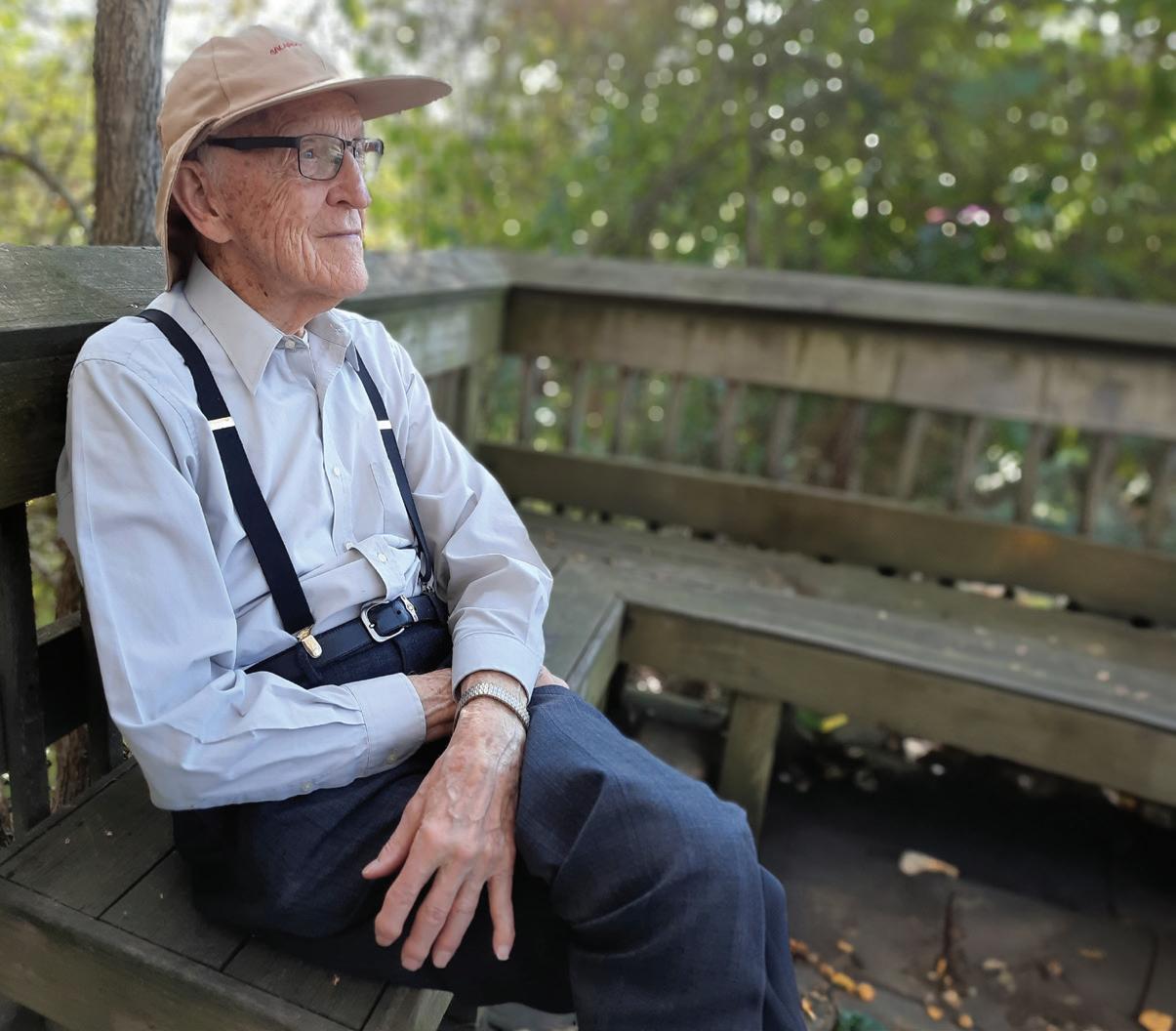 BY BETH THOMAS WITH ARTHUR WEAVER
BY BETH THOMAS WITH ARTHUR WEAVER
It was late on November 29, 1923, in the boys’ dormitory of Bethel Academy in Wisconsin, USA. Ernest Weaver, dean of men, and his wife, Olive, school nurse, eagerly awaited the arrival of their newborn son, Arthur Willard. One-and-a-half-year-old sister Wilma slept quietly in an adjoining room, blissfully unaware of the miracle happening in her home that night.
When Arthur was 6 months old, his father accepted a position as principal of Fox River Academy in Sheridan, Illinois, USA. They continued there for several years. When Arthur was 7, his father went back to school, enrolling in Emmanuel Missionary College, now Andrews University.
After completing his education, Ernest moved his growing family to Ithaca, Michigan, USA, where there was a church school nearby. He wanted his children to have a Christian education, scraping and saving to make that possible. After one year in Ithaca, Ernest received a call to serve as principal of Adelphian Academy in Holly, Michigan. Arthur began fourth grade at Holly church school.
EARLY ASPIRATIONS
From a young age Arthur knew he would like to be a mission doctor. He credits this to his parents reading mission stories to him. In September 1941 he registered as a premedical student at Emmanuel Missionary College. In October that same year he received a letter from the president of the United States, requiring him to serve in the World War II conflict.
In January 1942 he joined hundreds of other young men in basic training at Camp Barkeley, Texas, USA. He was invited to attend officers’ training school but turned it down, knowing that he would be expected to bear arms. Before completing basic training, Arthur was chosen for pharmacy training at Fitzsimons General Hospital in Colorado. While there he learned to make various ointments, cough medicines, and more.
The captain in charge of the pharmacy program told Arthur that it was a six-day-a-week program. When Arthur told him he would not be available on Saturdays, the captain replied, “You’ll probably not make it [in this program], but you can try.” Providentially, the captain gave Arthur a key to the laboratory on Sundays so he could make up Saturday assignments. At the end of the three-month program Arthur received the top grade in the course and was chosen Best Soldier in the camp of 5,000 troops.
From Fitzsimons Hospital Arthur was sent to San Francisco, California, USA, where, although he was in the Army, he spent two and a half years on a ship traveling throughout the Pacific region, taking troops in and out of combat zones. While deploying Pacific troops, he received his first furlough and was able to go home.
One night during his leave Arthur says, “The lights were low in my parents’ living room, and I thought it was a good time to ask
Faith in Action
22 March 2024 AdventistWorld.org
Photos
Courtesy of Arthur Weaver
my girlfriend, Natalie Wheeker, if she would marry me. I took a deep breath and asked, ‘Natalie, would you like to cook for me the rest of your life?’ She answered, ‘Sweetheart, I’d sure like to try.’ ” They were married on June 26, 1945, on Arthur’s second leave.
Arthur was honorably discharged from the U.S. Army in November 1945 and enrolled in premedical courses at Pacific Union College in northern California. After just three years of college, he was admitted to the College of Medical Evangelists, now Loma Linda University. Upon his graduation in 1952, the couple moved back to Michigan for Arthur’s internship and surgical residency, followed by five years of private surgical practice.
WILLING SERVANTS
In the summer of 1960 Arthur received an invitation from the General Conference to serve as a mission surgeon in Karachi, Pakistan—an answer to his childhood dream. In November the family, which now included six children under the age of 12, boarded a ship, spending one month in travel with their household items and arriving in Karachi on January 1, 1962.
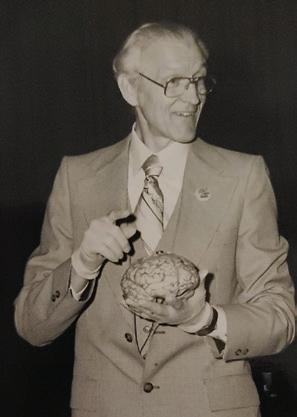
This allowed him to invest more time in ministry. For years Arthur and his friend Dick Lane organized Maranatha mission trips, building churches in Central and South America. Arthur and Natalie became very active in planning annual health retreats at the Michigan Conference’s Camp Au Sable to help people stop smoking and improve their overall health and lifestyle. The Weavers became well-known in the community for their hospitality.
An article in the December 1978 issue of Ministry magazine featuring the couple relates:

Arthur relates, “Those five years I spent in Pakistan as chief surgeon at the Seventh-day Adventist hospital in Karachi, then considered the premier hospital in the country, were some of the most productive and interesting of my entire life—an inestimable blessing to my family!”
In 1966 the Weavers returned to the United States, where Arthur joined the faculty of Wayne State University in Detroit, Michigan, and for 32 years taught surgery at the Veterans Administration Hospital and the Detroit Medical Center while actively conducting many stop-smoking clinics.
In 1998, at age 75, Arthur retired.
“Dr. Weaver held several widely publicized Five-Day Plan to Stop Smoking sessions in the Detroit area. Natalie had such a reputation for vegetarian cookery, based on her cooking schools, that Detroit newspapers and radio and television stations would occasionally refer people to her who expressed an interest in healthful living. So the Weavers began inviting callers to their home for a meal. They invited people—one or more an evening—to their home over a several-week period. Then they called them up and invited them to join an interdenominational Bible study group—to be associated with a buffet-type meal. Several members of the study group were baptized. The Weavers carefully avoided pressuring anyone to take a stand. The result was that those who had not made a decision
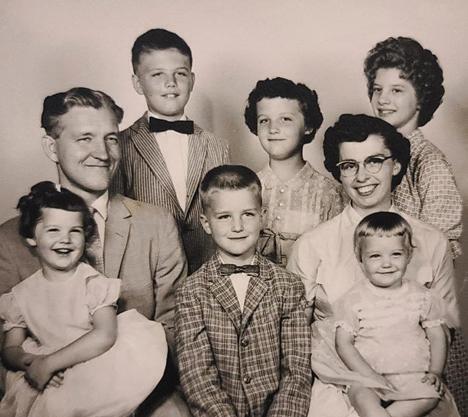
still felt comfortable in the group. And since most of the topics were of their own choosing, they continued to study the Bible, and the Lord continued to work on their hearts.”*
Just after Christmas 2016 Natalie, Arthur’s devoted partner of 72 years, developed abdominal issues and, after spending a month in the hospital, passed away. In 2018 Arthur married widow Mary Lou Ford Steinweg.
In November 2023 family and friends joyfully celebrated Arthur’s 100th birthday. In looking back over his remarkable life, he laughingly says, “The main thing I can say is that I am, of all people, most blessed! From beginning to end I must give God credit for a long, productive, and well-lived life (and it ain’t over yet!).” Arthur and Mary Lou are still active—serving the Lord through a ministry to prisoners, through the mail.
Arthur’s legacy of service has extended to his children and grandchildren, who are surgeons, doctors, physician’s assistants, social workers, dental hygienists, physical therapists, nurses, and educators.
* Adapted from https://www.ministrymagazine.org/ archive/1978/12/mealtime-evangelism.
Arthur Weaver is a retired surgeon, educator, missionary, and author residing in Michigan. Beth Thomas is assistant editor for Adventist Review Ministries.
Left: Dr. Weaver during one of many health lectures.
23 AdventistWorld.org March 2024
Right: A family photo taken before leaving for Karachi.

Discovering the Spirit of Prophecy
“That They All May Be One”
In
His
John 17:21 prayer Jesus asked for the gift of unity among believers.
One can find many examples in the life and writings of Ellen White where the gift of prophecy served to foster this unity in the church—not only among church members but also among our church’s institutions. One that is lesser known involves a testimony Ellen White wrote in 1899 to the “managers and foremen” of six of our major publishing houses. She opened her nine-page letter with these words:
“I am alarmed by the spirit of rivalry which is coming into our publishing houses. It is most manifest in our oldest printing offices, but the same spirit is working elsewhere. This spirit, wherever manifested, is displeasing to God. If it is allowed to exist, it will grow and strengthen, and as it grows and strengthens it will crush out the missionary spirit. It will grieve the Spirit of God, and lead to such a course of action as will drive away from the institution and its workers the ministering angels sent to be co-workers with those who cherish the grace of God.”1
How was such a pointed testimony received by the leaders of our publishing houses? In at least one instance we know the answer. The story is told by Henry Franz Schuberth.2
JUST IN TIME
Henry was born in 1868 in Germany, but emigrated to the United States, where, in his early 20s, he began his connection with the church as a Bible worker and literature evangelist for the Oakland Mission in California. At his very first camp meeting, in September 1889, he was introduced to Ellen White by Elder Nathaniel McClure, the superintendent for the city mission. He recalled Mrs. White asking him, “If you are willing to help me, you may look after the horse and buggy which a sister has lent me to use during my stay at Oakland.” Henry was happy to do so and often drove her buggy for her visiting and errands.
As was often the case, Mrs. White expressed an interest in this young person’s future. She asked him if he would like to attend the upcoming German school to be conducted
iStock / Getty Images Plus / Getty Images 24 March 2024 AdventistWorld.org
Photo:
PeopleImages /

at Battle Creek College. He replied that he had been praying about that possibility, but lacked the money needed. His father had cut him off from any financial support so long as he was connected with the Adventists.
Ellen White replied, “That does not matter; we will take care of you and take you to Battle Creek.” Mrs. White was headed there for the General Conference Session, and as the school wouldn’t open for another three weeks, Henry was invited to stay in her home. He wrote that his experience during the weeks of that conference “made such a deep impression upon my mind that I shall never forget it.”
But back to Ellen White’s 1899 testimony to the publishing house leaders. After completing his education, Henry taught at Union College in Nebraska, and then, in 1894, was asked to return to Germany and
head the newly opened 15-student training school in Hamburg, Germany. He was also given the responsibility of the Hamburg Publishing House, along with Elder L. R. Conradi. Here we will continue the story in Henry’s own words:
“There was a little difficulty among the workers in that institution [the publishing house]. It involved a plan of missionary work in the city after work hours. I was leading out in a certain plan and urging it. One brother particularly fell out with the proposals, and others joined him. A spirit of separation entered into our meetings, and a situation arose that greatly troubled me.
“On a certain Sunday I asked different members of the office family to come to a meeting in the chapel on Monday evening for a special council. I felt that we must somehow get the difficulties adjusted. Monday morning I went to my desk. There was a letter bearing Australian postage stamps, with the name ‘E. G. White’ printed in the corner. I opened the envelope. In it was a message from Mrs. White, dealing with the very matters that had made the trouble in our institutions.
“That night at the meeting I asked the workers, ‘When did I call this meeting?’
“
‘Yesterday,’ they said.
“
‘Well,’ I said, ‘this morning I received in the mail a message from Mrs. White from Australia. It deals with the very matter about which I wanted to speak to you.’
“I read the testimony to them, and then spoke of my own relation to the counsel given in it. At once the brother who had caused the difficulty stood to his feet and took a fine Christian stand. One after another followed, and the Lord helped us out of all our difficulties.
“Now, anybody might think that since I was well acquainted with
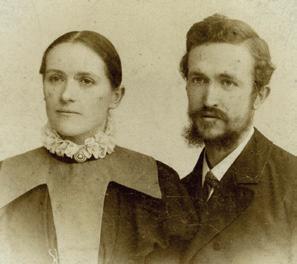
Mrs. White, I had written to her in Australia. But in those days it took about six weeks for mail from Hamburg to reach Australia, and the whole difficulty had arisen within the preceding three weeks. So the message from Mrs. White left Australia about three weeks before the difficulty arose in Hamburg, and arrived just the morning of that day when I needed the help.”
Henry immediately wrote to Ellen White’s son W. C. White, expressing his appreciation for the timely instruction:
“Dear Brother: Yours of Sept. 25 and the testimony [from Mrs. White] I received just in the morning when I intended to search for a testimony to read in a meeting with our workers. I had appointed for that same evening to seek the Lord; so it just came in time and has done us all good and we all recognized it as just the thing we needed and are thankful that we could see ourselves in the right light, confess the wrong and receive forgiveness.”3
“Till we all come to the unity of the faith and of the knowledge of the Son of God” (Eph. 4:13). “Even so, come, Lord Jesus!” (Rev. 22:20).
from
3
1 Ellen G. White letter 148, 1899 (Sept. 24).
2 Unless otherwise credited, the quotations that follow are
H. F. Schuberth, “My Confidence in the Spirit of Prophecy,” Review and Herald, June 1, 1939, p. 15.
H. F. Schuberth to W. C. White, Nov. 8, 1899.
Tim Poirier is vice director of the Ellen G. White Estate.
25 AdventistWorld.org March 2024
Henry and Elisabeth Schuberth Ellen G. White Estate
QGod’s Sovereignty in a Fragmented World
AWhy was all authority given to Jesus after His resurrection (Matt. 28:18)? Didn’t He have it before?
I will briefly summarize Jesus’ authority during His earthly ministry, the problem of the cosmic conflict, and the divine granting of all authority to Jesus.
JESUS’ AUTHORITY
In Matthew the earthly ministry of Jesus is characterized by a constant manifestation of His authority. He has teaching authority (7:29) and even the authority to forgive sins (9:6, 8), anticipating the fullness of His saving work for us. Some Jewish leaders questioned His authority (21:23), but in contrast to them a Roman centurion publicly acknowledged that Jesus had authority to heal the sick (8:5-13). Jesus Himself testifies to His authority to work on behalf of others (21:27) and clearly states that the Father has handed over everything to Him—placed them under His authority (11:27). It is obvious that Jesus had a God-given authority before His resurrection.
CONFLICT AND DIVINE SOVEREIGNTY
During His earthly ministry Christ could not fully manifest His universal sovereignty. A segment of creation had rejected God’s authority, claiming independence from Him. Over that segment of creation, Jesus did not yet have full authority—the capacity to use His power to bring radical change. He taught the disciples to pray, “Your kingdom come, Your will be done, on earth as it is in heaven” (6:10; NASB),* but that was not yet the case. Satan tempted Jesus to worship him and become his coregent over the kingdoms of this world, but Jesus only rebuked him (4:8-10). The conflict was intense because Satan constantly opposed the work of Christ (13:19; 16:23). Demons questioned Jesus’ authority to impede them to do their work, arguing that He did not have, at least for now, authority to destroy them (8:29;
cf. Luke 4:34). Demons seem to have known that a radical change was soon to come.
REESTABLISHING DIVINE SOVEREIGNTY
Things changed as a result of the sacrificial death of Jesus. Now He could implement the divine plan to judge the whole world, separating the righteous from the wicked, to give to each one their eternal reward (25:31-46), and to eventually destroy, once and for all, Satan and his demons (8:29; 25:41). He can now exert His authority to save, and to condemn and exterminate the wicked. There is no longer a segment of creation outside His authority: “All authority has been given to Me in heaven and on earth” (28:18).
By giving His life as a ransom for many (20:28), He legitimized the divine authority to save those who place their faith in Him (26:28; 25:34). The integrity of God’s character could no longer be questioned when saving sinners (cf. Rom. 3:25, 26) or condemning unrepentant sinners (Phil. 2:10, 11; Rev. 5:13). The postresurrection words of Jesus to the disciples contain four main ideas (Matt. 28:18). First, Christ received all authority and consequently there is no one who can validly contend with Him as sovereign Lord. Second, Christ is now coregent with God, crowned as king in heaven. He is the messianic king; the King of kings. Third, He introduces Himself to the disciples as the mediator between them and the Father. The authority Jesus received from the Father He shares with the disciples as He calls them to proclaim the gospel (Matt. 28:19, 20). Fourth, the phrase “heaven . . . earth” emphasizes the universal extent of the authority of Jesus. There is not a corner in the universe that will not be under the loving rule of God. This rule will be universally displayed at the second coming of Christ.
* Scripture quotations marked NASB are from the New American Standard Bible, copyright © 1960, 1971, 1977, 1995,
Ángel Manuel Rodríguez, Th.D., is retired after a career serving as pastor, professor, and theologian.
2020 by The Lockman Foundation. All rights reserved.
Bible Questions Answered
26 March 2024 AdventistWorld.org
Health

Let Food Be Thy Medicine
Can diet cure diseases?
I live in a rural area where there is not ready access to medical care and hospitals. We have heard that food should be our medicine and medicine our food. This is very appealing to us who have limited health care, but is it true?
The statement “Let food be thy medicine, and medicine be thy food” is often attributed to Hippocrates, an early Greek physician. Researchers have carefully examined the available records, and this statement has not been found in his writings.* Hippocrates emphasized the important links between health, food, exercise, and medicine, but did not confuse their specific and combined roles. Regardless of origins, this statement is a double-edged sword with both truth and danger, because it oversimplifies both cause and effect.
Nutrition is one influence among numerous factors determining our health and wellness. When we consume calorie-dense, highly refined foods, disregarding portion size, and wash it all down with endless servings of sugary drinks, we set the scene for obesity, type 2 diabetes, high blood pressure (hypertension), heart disease, and even cancer.
Other factors include socioeconomic circumstances, preventive health care, the immediate environment, genetics, exercise, sleep, and avoidance of alcohol, tobacco, and other at-risk behaviors; these all contribute significantly to quality of life. The availability of healthful foods, open spaces, and the opportunity to exercise safely in the outdoors are clear factors that explain how longevity is related more to one’s zip code than to any other single factor!
We may unintentionally shame people when we say “You are what you eat” without giving due consideration to individual circumstances, such as ubiquitous food deserts, poor food security, inaccessible, often unaffordable health care, and general socioeconomic disparities prevalent worldwide.
We need to teach the facts and share solutions compassionately and kindly. This includes educating how to choose the healthiest options from available, affordable foods, and how to prepare tasty, nourishing meals. Adventist congregations can demonstrate the blessing of community gardens by growing fresh produce for whoever may need it. The prudent use of foods promotes health and may prevent lifestyle diseases.
Can diet cure diseases? Eliminating gluten from the diet in those who have gluten sensitivity is the current cure for this specific problem.
In scurvy, which is caused by a deficiency of ascorbic acid (vitamin C), the consumption of citrus and other foods rich in vitamin C is curative. Careful nutrition and avoidance of refined carbohydrates, along with exercise, weight loss, stress management, and avoiding the shaming and blaming “you brought this on yourself” approach, can improve and may even reverse type 2 diabetes. Healthy eating is a large part of the cure, along with medicines as needed. We should also beware that obsessive attempts to eat perfectly may lead to serious eating disorders.
The short answer to your question: nutrition matters, medicines matter. We need the balance of prevention, treatment, and best medical practices when healthy or ill. We have an opportunity to demonstrate God’s love and compassion by caring, sharing, and meeting people’s needs in practical ways, as did Jesus. Then He bade them follow Him. Let’s do likewise!
* Diana Cardenas, “Let Not Thy Food Be Confused With Thy Medicine: The Hippocratic Misquotation,” e-SPEN Journal 8, no. 6 (2013): e260-e262, https:// doi.org/10.1016/j.clnme.2013.10.002; https://www.sciencedirect.com/science/article/pii/S2212826313000924.
Peter N. Landless, a board-certified nuclear cardiologist, is director of Adventist Health Ministries at the General Conference.
Zeno L. Charles-Marcel, a board-certified internist, is an associate director of Adventist Health Ministries at the General Conference.
& Wellness
27 AdventistWorld.org March 2024
Photo:
Luke Michael
“Please, God . . .”
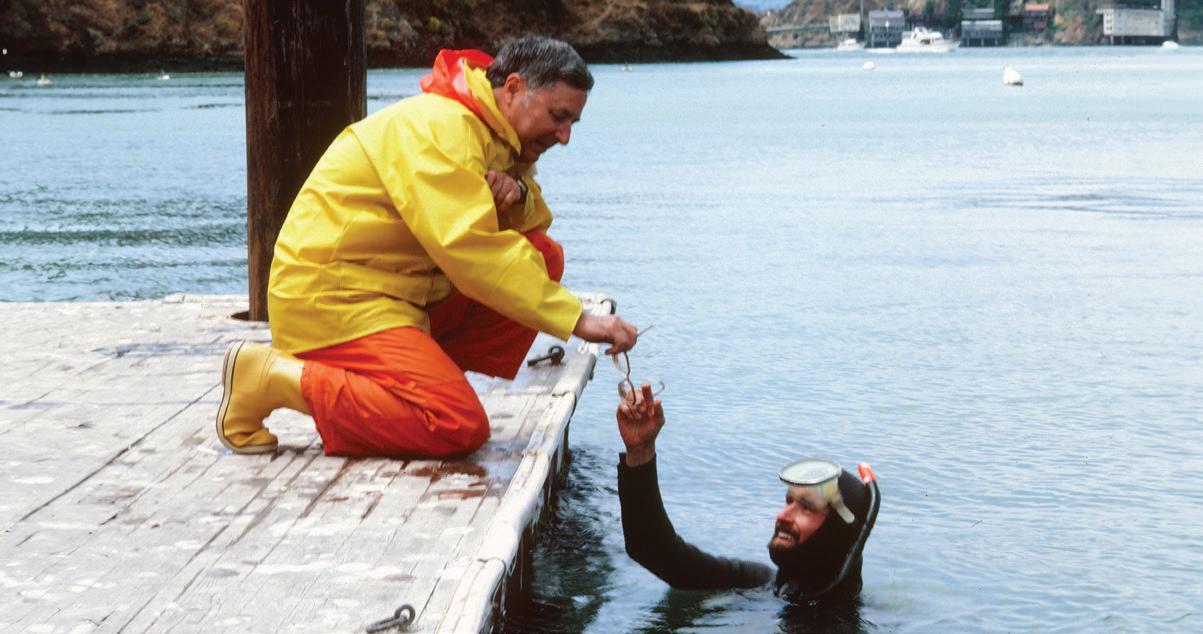
Iwatched silently as Herb’s face wrinkled into a mask of desperation. Then an intense whisper blew away the silence. “No! Not my glasses!”
“May I Tell You a Story?”
BY DICK DUERKSEN
We were sailing on the San Francisco Bay, threading our way around Alcatraz Island, then catching the summer wind toward the Golden Gate Bridge. The cloudy California day included strong winds, rolling waves, and lighthearted fellowship.
We passed beneath the bridge in the company of several other sailboats, enjoyed a brief time on the open ocean, and then turned back toward Angel Island.
FROM JOY TO DISASTER
A friend of the college had invited the Pacific Union College administrative council (ADCO) to join him for a day of sailing on his large and beautiful boat. Malcolm Maxwell, our college president, was an avid sailor and quickly agreed. Then he called the rest of us to share the good news.
“It’ll be next Tuesday,” he said, “and you’ll love it!”
At the dock we listened carefully to the captain’s instructions. Those included life vest locations, how to walk when the boat was in large waves, how to flush the toilet, and when the sandwiches would be ready.
Got it, I thought as I tightened my jacket in the cold wind.
I had not been to Angel Island, though the rest of our family had been there on a school bicycling trip a few months earlier. Angel Island is the largest island in the San Francisco Bay and since the late 1800s has served as an immigration processing center, and as the “last stop” for thousands of World War II troops who were on their way across the Pacific. Today it is a California state park, with hills and beaches ideal for families who love bicycles.
We had left our bicycles home, but were looking forward to touring some of the old government buildings after docking at Ayala Cove.
As our captain brought us slowly into the dock, one of our administrators, Herb Ford, jumped down to the floating dock, saying he would help with the tie-down. As Herb’s feet met the wooden dock, everything moved, and the rest of us watched helplessly as he was catapulted off the dock and into the water beyond. As he emerged from the water, we all saw that the glasses he had had on his face going into the water were no longer there! They had spun off and were now somewhere deep in the murky water of the San Francisco Bay!
For a few moments I don’t think anyone breathed.
Then I saw desperation replace Herb’s normal smile. “No!” he whispered. “Not my glasses!”
Herb is a scholar, a writer, and a wordsmith, a person whose eyes are always busy gathering colors, shapes, and ideas. Many people “look.” Herb “sees.” When his glasses are perched on his nose, he sees clearly. Without them, Herb is a lost man.
Each member of ADCO immediately felt Herb’s pain. Our sailing adventure had become a disaster.
DOES GOD CARE?
We peered over the edge of the ship, hoping to see the glasses caught on a
28 March 2024 AdventistWorld.org
Photo: Dick Duerksen
rope or hanging on a piece of seaweed. We climbed down to the dock, knelt at the edge, and made shadows on the water surface so we could see more clearly. We talked with the man who was checking our state park pass.
“How deep is the water under our boat?” we asked. “How clear is it down there?”
“Are there any sharks?” “Do you have any diving equipment we could borrow?”
His answers made the situation feel impossible. There was no diving equipment. The water was about 12 feet deep, very muddy and cold. “You won’t see anything down there, and you’ll need a wetsuit if you dive,” he frowned. “Sorry about that.” Then he went back to work.
I sat on the dock, thinking about glasses, God, and prayer. “Does God care about Herb’s glasses?”
Two fishermen were cleaning their catch on the beach. I wandered up toward them, wondering how they might be able to help and what I should ask them. Partway there, God suggested I should pray. Again. Maybe He does care about Herb’s glasses, I thought.
Lord, Herb’s blind without his glasses. Yes, he can see shapes and shadows, but nothing more. He’s going to need those glasses. In fact, he needs them right now! If there’s a way, please show me.
“Hi, there.” I tried to sound wise as I greeted the fishermen. “One of my friends has lost his eyeglasses beside the dock. Any way you might be able to help him out?”
Dumb question, I shouted to myself.
“Oh, no!” one of them exclaimed. “I don’t know what we could do, but we do have a snorkel and goggles. You can use them if you decide to dive in and look.”
The other man chuckled. “I’ve got a wetsuit too.” He slowly measured my size with his eyes. “I think you could get into it. Maybe.”
LEARNING A LESSON
I did not want to dive into the murky water beside the Ayala Cove dock. I did not want to squeeze into a wetsuit two sizes too small. I did not want to run my
clean hands into the mud and goop and unmentionables that might be hiding under the dock. I did not . . .
I’m thinking about Herb’s glasses, God said quietly into my ear. Snorkel, mask, and wetsuit. What more do you need?
But, God . . . My conversation sounded more like a complaint than a prayer. I was hoping You might make them float, or send an expert diver with a large underwater flashlight. It’s been a couple years since I did any ocean diving, and I wasn’t planning to dive today.
You, God said. Now.
The wetsuit required considerable squeezing and exhaling, but the snorkel and mask were fine. The water proved to be cold, without icebergs. The muck was worse than I had imagined. As I swung my fingers from side to side through the deep layers of “stuff” on the bottom, I tried not to imagine losing my hand to a broken bottle or a sea dragon.
“Nothing down there, Herb. I’m sorry.”
“Please try again, Dick. I’ll pray for you.”
There was nothing the next time, either, and now a small crowd was gathering to watch me fail.
Lord, Herb needs his glasses, and I need this to be my last dive. Please send the glasses to me.
My fingers passed through something sticky and gooey, then my right hand clipped into something hard and spindly—with handles! I grabbed tightly and kicked for the surface, right hand first. By the time I lifted the mask, Herb was reaching down, shouting loudly, and reaching to take his glasses from my hand.
Did God care about Herb’s glasses? Herb thought so. The fishermen thought so. The state park officer thought so. The captain and the other members of ADCO thought so.
Me? I think God knew I needed a lesson in trust, and He gave it to me, the wet way.
Publisher
The Adventist World, an international periodical of the Seventh-day Adventist Church. The General Conference, Northern Asia-Pacific Division of Seventh-day Adventists , is the publisher.
Editor/Director of Adventist
Review Ministries
Justin Kim
International Publishing Manager
Hong, Myung Kwan
Adventist World Coordinating Committee
Yo Han Kim (chair), Tae Seung Kim, Hiroshi Yamaji, Myung Kwan Hong, Seong Jun Byun, Dong Jin Lyu
Associate Editors/Directors in Silver Spring, Maryland, USA
Sikhululekile Daco, John Peckham, Greg Scott
Assistant Editors based in Silver Spring, Maryland, USA
Enno Müller, Beth Thomas
Editors based in Seoul, Korea Hong, Myung Kwan; Park, Jae Man; Kim, Hyo-Jun
Digital Platforms Director
Gabriel Begle
Director of Systems Integration and Innovation
Daniel Bruneau
Operations Manager
Merle Poirier
Editorial Assessment Coordinator
Marvene Thorpe-Baptiste
Advisor E. Edward Zinke
Financial Manager
Kimberly Brown
Distribution Coordinator
Sharon Tennyson
Management Board
Yo Han Kim, chair; Justin Kim, secretary; Hong, Myung Kwan; Karnik Doukmetzian; SeongJun Byun; Hiroshi Yamaji; Joel Tompkins; Ray Wahlen; Ex-officio: Paul H. Douglas; Erton Köhler; Ted N. C. Wilson
Art Direction and Design
Mark Cook, Brett Meliti, Ivan Ruiz-Knott
/Types & Symbols
To Writers: We welcome unsolicited manuscripts. Address all editorial correspondence to 12501 Old Columbia Pike, Silver Spring, MD 20904-6600, U.S.A. Editorial office fax number: (301) 680-6638
E-mail: worldeditor@gc.adventist.org
Web site: www.adventistworld.org
Unless otherwise indicated, all Bible references are taken from the New King James Version®. Copyright © 1982 by Thomas Nelson. Used by permission. All rights reserved. Texts credited to NIV are from the Holy Bible, New International Version®. Copyright © 1973, 1978, 1984, 2011 by Biblica, Inc.® Used by permission. All rights reserved worldwide. Bible texts credited to NRSV are from the New Revised Standard Version of the Bible, copyright © 1989 by the Division of Christian Education of the National Council of the Churches of Christ in the U.S.A. Used by permission.
Adventist World is published monthly and printed simultaneously in Korea, Brazil, Indonesia, Australia, Germany, Austria, Argentina, Mexico, South Africa, and the United States.
Vol. 20, No. 3
Dick Duerksen, a pastor and storyteller, lives in Portland, Oregon, United States.
29 AdventistWorld.org March 2024

The Legend
Old Uncle sat quietly staring into the fire. It was evening in his African village, and he was alone in the center of their small group of huts. Little by little, other villagers began to join him. They were tired from a hard day of work, but no one would even think of missing this nightly event. It was story time!
A hush fell over the group as Old Uncle raised his eyes and looked slowly around the circle. Children shivered in excitement and snuggled in close to their mothers. What would Old Uncle tell them tonight? Would he repeat one of the stories of their ancestors? Or maybe he would recite a long poem from memory. Sometimes he told them about the world news. Other times he carefully described a plant, bird, insect, or animal— telling them where it lived and how to care for it and use it. What would it be tonight?
Finally, when everyone was there, Old Uncle stood slowly to his feet and cleared his throat, “Once upon a time a traveler
started out on a long journey.” As he said those words, the cares of the day slid silently into the darkness, and everyone whispered in their minds, “Oh, tonight it will be a legend.”
Old Uncle was a master storyteller, and soon everyone had almost forgotten him, the stars, the fire, and the cool night air. Instead, they found themselves trudging through the hot desert sands on this journey Old Uncle was describing for them in vivid detail.
The traveler had started early, but it had gotten very hot. By midday he knew he was in trouble. Somehow he must have missed a turn, and he was lost. Lost out in the blazing desert.
As he reached for another drink, he realized his water was gone too! Oh, no! What would he do now? Carefully he checked each bottle, but all of them were empty. He shook the last drops from the sides of the bottle into his mouth and continued walking.
Mile after mile he plodded on, not really knowing where he was going, but knowing he had
to keep going or die for sure. Suddenly he stopped. What was that? He rubbed his eyes to make sure he wasn’t seeing things. There was a tree in the distance! A real tree! With a dry little gasp the traveler rushed forward as fast as his dehydrated body would go. Finally, when he thought he couldn’t possibly take another step, he reached the tree and collapsed under its branches.
Now, if he was going to die, at least he could die in the shade! Then, as he lay there, he heard something. Drip. Drip. Drip. It sounded like water! He sat up and looked eagerly around. And sure enough, there was a slow drip of water coming out of the tree and into the sand.
Quickly the traveler pulled out an empty cup and set it in the sand. Drip. Drip. Drip. He licked his lips. No, he wouldn’t let himself take the cup yet. He would wait till it was almost full, and then he would drink it. But it was so hard to wait. Drip. Drip. Drip. Again and again he reached out to take the cup and
Fun-filled
Growing Faith
pages for younger ages
Illustration: Mugi Kinoshita 30 March 2024 AdventistWorld.org
BY HOMER TRECARTIN

then had to pull his hand back.
Now. Just a few more drips, and he could drink. There. It was full. But just as he reached for the cup, something whooshed out of the tree, hit the cup, and spilled the precious water into the dry desert sand.
“No!” he screamed at the bird that had flown down and tipped over his cup.
Hot tears of anger and disappointment ran down his cheeks. He grabbed the cup and jabbed it back into the sand. Drip. Drip. Drip. This time he stood guard. And finally, just a few more drops, and he could take a drink. Whoosh. The bird, a dove, flew in from another direction, tipped over the cup, and swooshed back up into the tree.
Screaming in rage, the man set the cup up again. Drip. Drip. Drip.
Four more times, just as the cup was almost full, the dove swooped out of the tree, through his legs, under his arms, and spilled the cup just before he could drink. Now the angry traveler noticed a large rock nearby. For the seventh time
he set up the cup. This time he stationed himself with the rock raised over his head. He only half heard the drip, drip, drip. He only half noticed that the cup was again slowly filling. Instead, he held the rock poised and ready. And sure enough, just as the cup was almost full, the dove flew in and tipped it over.
“Aaaggghhhh!” the traveler shouted as he hurled the rock at the retreating bird. The flying rock hit the dove, and it fluttered to the ground. The traveler muttered. “Maybe now I can get something to drink.” But as he set the cup back in place, he noticed something. “No,” he shrieked. “You can’t stop now!” But the dripping had completely stopped!
Crying and shouting angrily, the man fell to the ground and sobbed. Then suddenly he stopped. What was that? Right up above him? In the tree where the water had been dripping? A huge snake. Its fangs were right over the spot where deadly venom, not water, had been dripping into his cup. Suddenly the traveler realized that the
Bible Treasure
“For God so loved the world that He gave His only begotten Son, that whoever believes in Him should not perish but have everlasting life” (John 3:16).
little dove had saved his life. And he had killed it!
Quietly Old Uncle walked slowly out of the flickering firelight. No one moved. They were deep in thought, wondering what the story meant.
“When I first heard that story as a little boy in the village,” my friend Peter told me, “I had no idea what it meant. But now that I am a Christian, I know. There is an old serpent called the devil and Satan who is going around trying in every way he can to destroy us. Jesus saved us from that ‘serpent’ poison, and we nailed Him to a cross when all He was trying to do was to save us!”
Peter went on with a smile, “But I praise God there is more to the story than what Old Uncle told us. Jesus didn’t just die for us. He rose from the grave! He is alive! And He is coming again to rescue us.”
Homer Trecartin is a retired pastor, teacher, administrator, and missionary.
*****
31 AdventistWorld.org March 2024



Let’s Connect! awr360 | awr360 | awr.360 | awr.org/videos | awr.org/apps Download the brandnew AWR360° app! Inspiration and a full media library at your fingertips! visit: awr.org/apps Adventist World Radio 12501 Old Columbia Pike, Silver Spring, MD 20904























 BY BETH THOMAS WITH ARTHUR WEAVER
BY BETH THOMAS WITH ARTHUR WEAVER












